 08/01/2009 02:21 08/01/2009 02:21 |
|
| | | OFFLINE | | Post: 16.195 | Registrato il: 28/08/2005
| Utente Gold | |
|

 Posted earlier today in the preceding page:
The Holy Father's first General Audience of 2009
Posted earlier today in the preceding page:
The Holy Father's first General Audience of 2009 - He talks about St. Paul's concept of divine worship.
 St John's gospel unquestioningly
St John's gospel unquestioningly
an 'eyewitness account' says Pope
by Richard Owen in Rome

January 6, 2009
'Unquestioningly'? I think the editor/headline writer meant 'unquestionably'! [The reporter gets it right; his editor flubs it!] Can't we even trust the Times of London to use English right? In any case, Richard Owen managed to turn up a polemical angle from the Pope's homily at the Mass for the Epiphany yesterday here, setting the Pope against the scholars this time.
Taking aim at scholars who doubt St John's Gospel as confirming the "historical reality" of Jesus, Pope Benedict XVI has declared that it is unquestionably an "eyewitness account".
The Pope said St John's Gospel was "the passionate testimony" of a man who as a young, humble fisherman had been attracted to Jesus, had loved him as a disciple, had shared his experiences at first hand for three years, and had seen Him die on the Cross and then rise again.
"From this experience, which he meditated in his heart, John drew an intimate certainty - that Jesus was the Knowledge of God incarnate" the Pope said during a recent Angelus address. [No, Sir! Not at Angelus. At Mass. To think this only happened yesterday! If a reporter is careless about the little obvious facts, will he be more scrupulous about bigger, more important facts that require close attention and verification?]
Gianni Gennari, an Italian theologian, said that whereas St Mark had learned much of Jesus's life and teachings from St Peter, St Luke was believed to have been given details by the Virgin Mary after Jesus's death and St Matthew had "put Jesus's parables and speeches in chronological order" with the skill of a former tax collector, St John was "different".
"He reflected on his experiences for years, and then put his personal memories together with a series of doctrinal statements on the relationship between Jesus and the Holy Spirit and on Jesus as the Word Incarnate", says Gennari [He is an ex-priest who married but has reconciled with the Church and has been writing a media-watch column and editorials for Avvenire.]
He said no one doubted the existence of figures such as Alexander the Great or Aristotle even though the first accounts of them appeared long after their deaths. By contrast the first known papyruses referring to Jesus dated to the end of the first century.
St John described himself arriving at Jesus's tomb before St Peter because he was younger and could run faster (20:1-6), and included other vivid details which could only have come from his own experience.
He had also described settings since confirmed as authentic by archeologists, such as the Pool of Bethesda, a rectangular pool uncovered in the nineteeth century near the Sheep Gate in Jerusalem with five porches or covered colonnades, where Jesus healed a lame man and told him "Take up thy bed and walk" (John 5:2-9).
Professor Gennari said John included details which Jesus shared only with the disciples, including his farewell speeches, as well as miracles not found in the Synoptics, such as raising Lazarus from the dead.
It is commonly held by supporters of St John's Gospel as a first-hand account that he is referring to himself when he repeatedly describes "the disciple whom Jesus loved".
However, beginning at the end of the nineteeth century, sceptics have suggested that inconsistencies and non sequiturs indicate the Gospel was put together by various authors, and is not a reliable source for Jesus's life and ministry. [Which doesn't make the account of events any less true! It just means other persons had an input into it, especially if, apparently, the 'inconsistencies and non sequiturs' do not alter the substance of the events recounted!]
La Stampa said the Pope was also responding to recent best-selling books on "the historical Jesus" written by the Italian author Corrado Augias with two Biblical scholars, Remo Cacitti of Milan University and Mauro Pesce of Bologna University.
![[SM=x40796]](http://www.vocinelweb.it/faccine/mad/pag4/51.gif) ![[SM=x40796]](http://www.vocinelweb.it/faccine/mad/pag4/51.gif) ![[SM=x40796]](http://www.vocinelweb.it/faccine/mad/pag4/51.gif) ![[SM=x40796]](http://www.vocinelweb.it/faccine/mad/pag4/51.gif) ![[SM=x40796]](http://www.vocinelweb.it/faccine/mad/pag4/51.gif) ![[SM=x40796]](http://www.vocinelweb.it/faccine/mad/pag4/51.gif) ![[SM=x40796]](http://www.vocinelweb.it/faccine/mad/pag4/51.gif) ![[SM=x40796]](http://www.vocinelweb.it/faccine/mad/pag4/51.gif) ![[SM=x40796]](http://www.vocinelweb.it/faccine/mad/pag4/51.gif) ![[SM=x40796]](http://www.vocinelweb.it/faccine/mad/pag4/51.gif) Meanwhile, still at the Times: Either the editors and reporters don't keep track of the stories they've already reported, or this second report on the same subject in less than 5 days (with little that is new except the malice) is actually a deliberate exercise in Schadenfreude - what amounts to a journalistic jig of gleeful gloating at the 'shrinking' attendance at Benedict XVI's public events. Richard Owen wrote about it on 12/31 - see Benefan's post in the previous page.
Meanwhile, still at the Times: Either the editors and reporters don't keep track of the stories they've already reported, or this second report on the same subject in less than 5 days (with little that is new except the malice) is actually a deliberate exercise in Schadenfreude - what amounts to a journalistic jig of gleeful gloating at the 'shrinking' attendance at Benedict XVI's public events. Richard Owen wrote about it on 12/31 - see Benefan's post in the previous page.
Or maybe their pretext is that the Sunday Times is a different newspaper from the weekday Times.
Crowds shrink for ‘bland’ Benedict,
the Pope who only ever says No

BY John Follain in Rome
January 4, 2009
THE crowds turning out for Pope Benedict XVI’s preachings and blessings at the Vatican are dwindling fast as the dour pontiff pays the price for his lack of charisma and visibility compared with John Paul II, his showman predecessor.
Figures from the Vatican show the number of pilgrims attending Benedict’s weekly audiences, mainly in a vast auditorium by St Peter’s Basilica, and his Sunday Angelus in St Peter’s Square where he speaks from his study window, shrank from 2.8m in 2007 to 2.2m in 2008.
This is a far cry from the 4m people who came to the Vatican or the papal summer residence of Castel Gandolfo in the first year after his 2005 election, when the novelty factor drew crowds bigger than in the final years of John Paul. The figures are expected to drop further as the economic downturn hits global travel.
Before his election as leader of 1 billion Catholics, Joseph Ratzinger, the German cardinal and theologian, had been branded “God’s rottweiler” and “the Panzerkardinal” because of his work as an enforcer of doctrine.
His personality was contrasted with John Paul, known as “the Grand Communicator” because of his media-friendly skills.
Visitors to the Vatican often pay tribute to John Paul. They shuffle past his tomb in the crypt of St Peter’s Basilica and postcards bearing his image still sell well.
Vito Mancuso, a theologian critical of Benedict, linked the smaller crowds to the worldwide fall in priestly vocations and decline in church attendance. He advised Benedict, 81, to stop “saying always and only ‘no’ ”. The Church needs to be more humble and doubtful about its rulings on the role of women, sexuality and bioethics, he said.
In the latest “no”, the Vatican on New Year’s Day stopped automatically adopting Italian laws because of potential “antiCatholic legislation” involving euthanasia and gay marriage. In an address to Vatican staff, Benedict said homosexuality threatened humanity as much as did rainforest destruction. {GRRRRRRRRrrrrrrrrrRRRRRRRRRRRRR!!! Enough already! There should be a hell at hand for all lying journalists.]
“Benedict’s papacy has in the long run a polarising impact inside the Catholic world. In one camp there are those who are enthusiastic about Ratzinger’s government; in the other camp are those who aren’t attracted by it,” said Marco Politi, a Vatican watcher.
Benedict’s appeal appeared strongest on his trips abroad last year; journeys to France, Australia and the United States were successful despite controversy over paedophile priests.
George Weigel, John Paul’s biographer, said the numbers going to the Vatican were still impressive.
“Can you imagine any other public figure in the world to whom millions of people freely come for instruction and inspiration? What’s most striking about the pilgrims at papal audiences under Benedict XVI is how carefully they listen to him; he’s a master teacher,” he said.
John Allen of the National Catholic Reporter, an American weekly, said Benedict was still drawing bigger crowds than John Paul at a comparable point in his pontificate but his appeal was limited to “Catholic insiders”. [Mr. Allen must met some members of this Forum who are not even Catholics. I can't believe he can be so short-sighted.]
“Last year Benedict drew nothing like the saturation coverage in the global press that surrounded John Paul at a similar stage of his papacy. [At a similar stage in his Papacy, John Paul II was the victim of an attempted assassination, the first ever against a Pope and he could have died from it. What could be better fodder for the media? Whereas Benedict is the continuing target of character assassination by the media. There's the big difference!] Benedict is a distinctly less interesting figure than John Paul for the outside world,” he said.
Benedict is unlikely to lose sleep over the dwindling crowds. “I don’t think he’ll tear his hair out. The Pope isn’t a celebrity. His problem is the clarity of his teaching – not how many listen, but how many remember the message,” said Rocco Buttiglione, a Christian Democrat politician and a friend of Benedict.
Benedict told Vatican staff he did not want to be a “star” around whom everything revolved, but “only and completely” the vicar of Christ.
Vittorio Messori, co-author of bestselling books with both John Paul and Benedict, dismissed the dwindling crowds as insignificant. “The Pope represents Jesus Christ and Jesus Christ isn’t subject to popularity rankings. In fact, the more a Pope ‘pleases’, the less likely he’ll be an authentic icon of Christ,” he said.
[Modificato da TERESA BENEDETTA 08/01/2009 09:39] |
|
 08/01/2009 13:48 08/01/2009 13:48 |
|
| | | OFFLINE | | Post: 16.197 | Registrato il: 28/08/2005
| Utente Gold | |
|

January 8
St. Lawrence Justinian, Bishop
OR for 1/7-1/8/09:
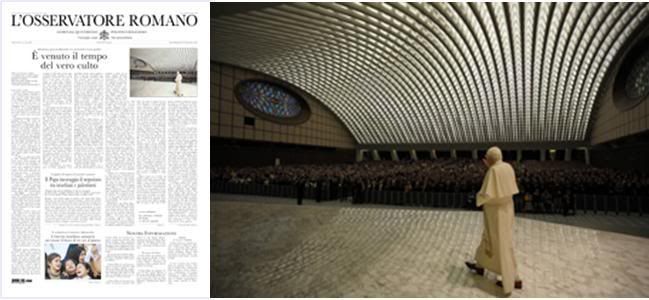
At the General Audience, Benedict XVI resumes catecheses on St. Paul:
'Time of true worship has come'
The issue also features the Holy Father's homily for the Mass of the Epiphany and his Angelus message afterwards. .

Page 1 has an update on the Gaza conflict, with Israel announcing a 3-hour ceasefire daily to allow humanitarian aid to get in.
THE POPE'S DAY
Address to the diplomatic corps - Traditional New Year's reception.
The Pope spoke in French, but the text has been released in all the official languages.
|
 08/01/2009 14:01 08/01/2009 14:01 |
|
| | | OFFLINE | | Post: 16.198 | Registrato il: 28/08/2005
| Utente Gold | |
|
 THE POPE'S NEW YEAR ADDRESS
THE POPE'S NEW YEAR ADDRESS
TO THE DIPLOMATIC CORPS
ACCREDITED TO THE VATICAN
The Holy Father met with the ambassadors accredited to the Holy See at the Sala Regia (Throne Room) of the Apostolic Palace
this morning for the traditonal New Year reception. The Vatican curently has diplomatic relations with 177 states.
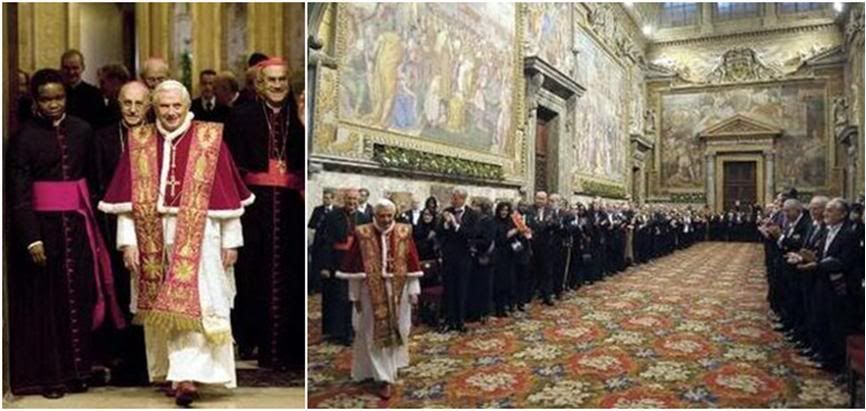
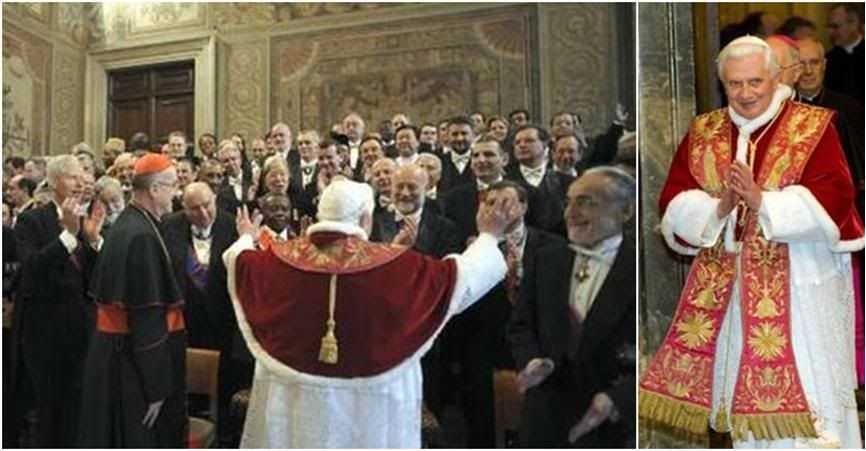
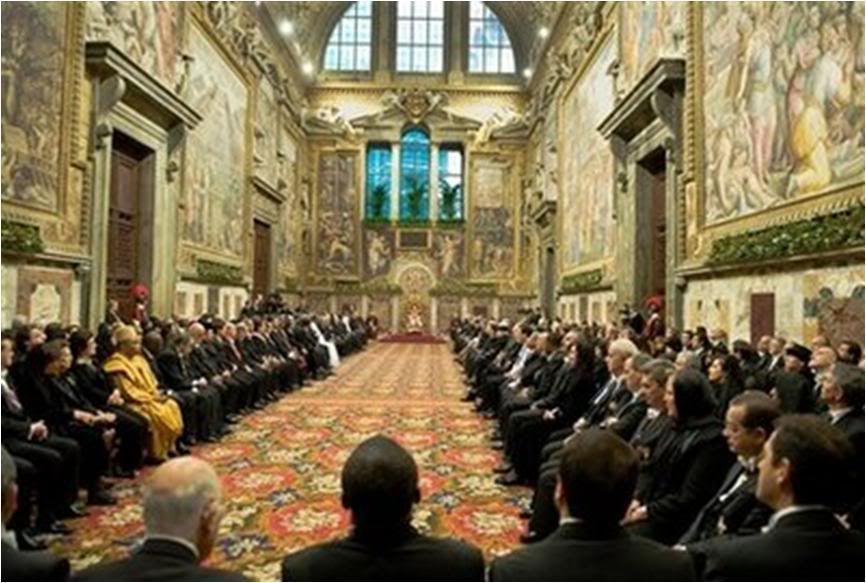 The new dean of the Vatican Diplomatic Corps delivers the greeting in behalf of his colleagues.
The new dean of the Vatican Diplomatic Corps delivers the greeting in behalf of his colleagues.
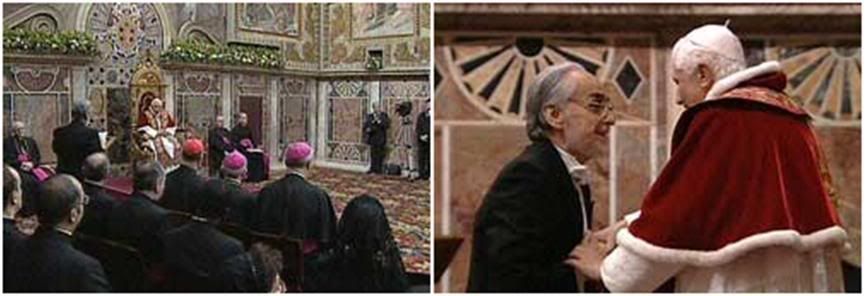
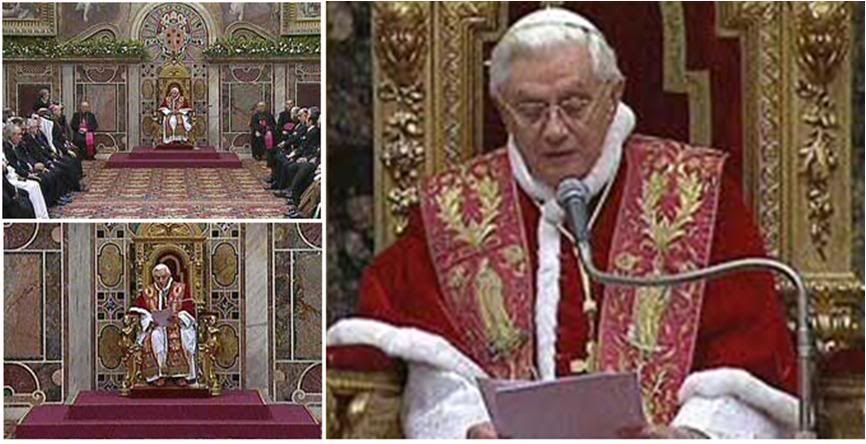 Here is the official English text of the address delivered by the Holy Father to the Vatican diplomatic corps.
Here is the official English text of the address delivered by the Holy Father to the Vatican diplomatic corps.
Your Excellencies,
Ladies and Gentlemen,
The mystery of the incarnation of the Word, which we re-live each year on the Solemnity of Christmas, invites us to reflect on the events marking the course of history.
And it is precisely in the light of this hope-filled mystery that this traditional meeting takes place with you, the distinguished members of the diplomatic Corps accredited to the Holy See – a meeting which, at the beginning of this new year, offers us a fitting occasion to exchange cordial good wishes.
I express my gratitude to His Excellency Ambassador Alejandro Valladares Lanza for the good wishes he has kindly offered me, for the first time as Dean of the Diplomatic Corps. My respectful greeting also goes to each of you, along with your families and staff, and, through you, to the peoples and governments of the countries which you represent. For everyone I ask God to grant the gift of a year rich in justice, serenity and peace.
At the dawn of this year 2009, I think with affection of all those who have suffered – whether as a result of grave natural catastrophes, particularly in Vietnam, Myanmar, China and the Philippines, in Central America and the Caribbean, and in Columbia and Brazil; or as a result of violent national or regional conflicts; or again as a result of terrorist attacks which have sown death and destruction in countries like Afghanistan, India, Pakistan and Algeria.
Despite so many efforts, the peace we so desire still remains distant! Faced with this reality, we must not grow discouraged or lessen our commitment to a culture of authentic peace, but rather redouble our efforts on behalf of security and development.
In this regard, the Holy See wished to be among the first to sign and ratify the "Convention on Cluster Munitions", a document which also has the aim of reaffirming international humanitarian law.
On the other hand, while noting with concern the signs of crisis appearing in the area of disarmament and nuclear non-proliferation, the Holy See has continued to reaffirm that peace cannot be built when military expenses divert enormous human and material resources from projects for development, especially the development of the poorest peoples.
It is towards the poor, the all too many poor people on our planet, that I would like to turn my attention today, taking up my Message for the World Day of Peace, devoted this year to the theme: "Fighting Poverty To Build Peace".
The insightful analysis of Pope Paul VI in the Encyclical Populorum Progressio has lost none of its timeliness: "Today we see people trying to secure a sure food supply, cures for disease, and steady employment. We see them trying to eliminate every ill, to remove every obstacle which offends man’s dignity. They are constantly striving to exercise greater personal responsibility; to do more, to learn more and to have more, in order to be more. And yet, at the same time, so many people continue to live in conditions which frustrate these legitimate desires" (No. 6).
To build peace, we need to give new hope to the poor.
How can we not think of so many individuals and families hard pressed by the difficulties and uncertainties which the current financial and economic crisis has provoked on a global scale?
How can we not mention the food crisis and global warming, which make it even more difficult for those living in some of the poorest parts of the planet to have access to nutrition and water?
There is an urgent need to adopt an effective strategy to fight hunger and to promote local agricultural development, all the more so since the number of the poor is increasing even within the rich countries.
In this perspective, I am pleased that the recent Doha Conference on financing development identified some helpful criteria for directing the governance of the economic system and helping those who are most in need.
On a deeper level, bolstering the economy demands rebuilding confidence. This goal will only be reached by implementing an ethics based on the innate dignity of the human person. I know how demanding this will be, yet it is not a utopia!
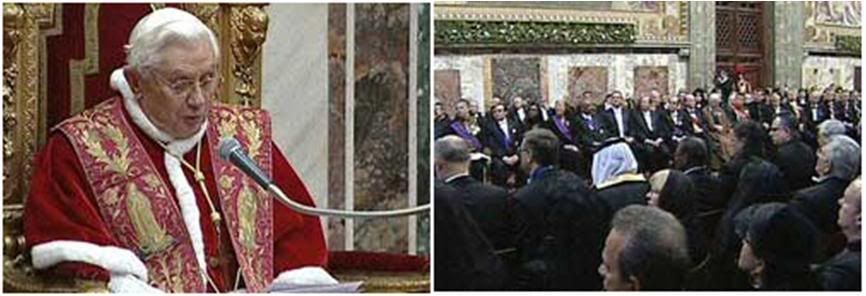
Today more than in the past, our future is at stake, as well as the fate of our planet and its inhabitants, especially the younger generation which is inheriting a severely compromised economic system and social fabric.
Ladies and Gentlemen, if we wish to combat poverty, we must invest first and foremost in the young, setting before them an ideal of authentic fraternity.
During my apostolic visits in the past year, I was able to meet many young people, especially in the extraordinary context of the celebration of the Twenty-third World Youth Day in Sydney, Australia.
My apostolic journeys, beginning with my visit to the United States, also allowed me to assess the expectations of many sectors of society with regard to the Catholic Church.
In this sensitive phase of the history of humanity, marked by uncertainties and questioning, many people expect the Church to exercise clearly and courageously her mission of evangelization and her work of human promotion.
It was in this context that I gave my address at the headquarters of the United Nations Organization: sixty years after the adoption of the Universal Declaration of Human Rights, I wished to stress that this document is founded on the dignity of the human person, which in turn is based on our shared human nature, which transcends our different cultures.
A few months later, during my pilgrimage to Lourdes for the hundred and fiftieth anniversary of the appearances of the Virgin Mary to Saint Bernadette, I sought to emphasize that the message of conversion and love which radiates from the grotto of Massabielle remains most timely, as a constant invitation to build our own lives and the relations between the world’s peoples on the foundation of authentic respect and fraternity, in the awareness that this fraternity presupposes that all men and women have a common Father, God the Creator.
Moreover, a society which is "secular" in a healthy way does not ignore the spiritual dimension and its values, since religion – and I thought it helpful to repeat this during my pastoral visit to France – is not an obstacle but rather a solid foundation for the building of a more just and free society.
Acts of discrimination and the very grave attacks directed at thousands of Christians in this past year show to what extent it is not merely material poverty, but also moral poverty, which damages peace. Such abuses, in fact, are rooted in moral poverty.
As a way of reaffirming the lofty contribution which religions can make to the struggle against poverty and the building of peace, I would like to repeat in this assembly, which symbolically represents all the nations of the world, that Christianity is a religion of freedom and peace, and it stands at the service of the true good of humanity.
To our brothers and sisters who are victims of violence, especially in Iraq and in India, I renew the assurance of my paternal affection.
To the civil and political authorities, I urgently request that they be actively committed to ending intolerance and acts of harassment directed against Christians, to repairing the damage which has been done, particularly to the places of worship and properties, and to encouraging by every means possible due respect for all religions, outlawing all forms of hatred and contempt.
I also express my hope that, in the Western world, prejudice or hostility against Christians will not be cultivated simply because, on certain questions, their voice causes disquiet.
For their part, may the disciples of Christ, in the face of such adversity, not lose heart: witness to the Gospel is always a "sign of contradiction" vis-à-vis "the spirit of the world"!
If the trials and tribulations are painful, the constant presence of Christ is a powerful source of strength. Christ’s Gospel is a saving message meant for all; that is why it cannot be confined to the private sphere, but must be proclaimed from the rooftops, to the ends of the earth.
The birth of Christ in the lowly stable of Bethlehem leads us naturally to think of the situation in the Middle East and, in the first place, in the Holy Land, where, in these days, we have witnessed a renewed outbreak of violence provoking immense damage and suffering for the civilian population.
This situation further complicates the quest for a settlement of the conflict between Israelis and Palestinians, something fervently desired by many of them and by the whole world.
Once again I would repeat that military options are no solution and that violence, wherever it comes from and whatever form it takes, must be firmly condemned.
I express my hope that, with the decisive commitment of the international community, the ceasefire in the Gaza strip will be re-established – an indispensable condition for restoring acceptable living conditions to the population –, and that negotiations for peace will resume, with the rejection of hatred, acts of provocation and the use of arms.
It is very important that, in view of the crucial elections which will involve many of the inhabitants of the region in coming months, leaders will emerge who can decisively carry forward this process and guide their people towards the difficult yet indispensable reconciliation.
This cannot be reached without the adoption of a global approach to the problems of these countries, with respect for the legitimate aspirations and interests of all parties.
In addition to renewed efforts aimed at the resolution of the Israeli-Palestinian conflict, which I have just mentioned, wholehearted support must be given to dialogue between Israel and Syria and, in Lebanon, to the current strengthening of institutions; this will be all the more effective if it is carried out in a spirit of unity.
To the Iraqis, who are preparing again to take full control of their future, I offer a particular word of encouragement to turn the page and to look forward in order to rebuild without discrimination on the basis of race, ethnic group or religion.
As far as Iran is concerned, tireless efforts must be made to seek a negotiated solution to the controversy concerning the nation’s nuclear programme, through a mechanism capable of satisfying the legitimate demands of the country and of the international community. This would greatly favour détente in the region and in the world.
Looking to the great continent of Asia, I note with concern that, while in certain countries acts of violence continue, and in others the political situation remains tense, some progress has been made, enabling us to look to the future with greater confidence.
I think for example of the new negotiations for peace in Mindanao, in the Philippines, and the new direction being taken in relations between Beijing and Taipei. In this same context of the quest for peace, a definitive solution of the ongoing conflict in Sri Lanka would also have to be political, since the humanitarian needs of the peoples concerned must continue to receive ongoing attention.
The Christian communities living in Asia are often numerically small, yet they wish to contribute in a convincing and effective way to the common good, stability and progress of their countries, as they bear witness to the primacy of God which sets up a healthy order of values and grants a freedom more powerful than acts of injustice. The recent beatification, in Japan, of 188 martyrs brought this eloquently to mind.
The Church, as has often been said, does not demand privileges, but the full application of the principle of religious freedom. In this perspective, it is important that, in central Asia, legislation concerning religious communities guarantee the full exercise of this fundamental right, in respect for international norms.
In a few months, I will have the joy of meeting many of our brothers and sisters in the faith and in our common humanity who dwell in Africa. In anticipation of this visit, which I have so greatly desired, I ask the Lord to open their hearts to welcome the Gospel and to live it consistently, building peace by fighting moral and material poverty.
A very particular concern must be shown for children: twenty years after the adoption of the Convention on the Rights of the Child, they remain very vulnerable. Many children have the tragic experience of being refugees and displaced persons in Somalia, Darfur and the Democratic Republic of Congo.
There are waves of migration involving millions of persons in need of humanitarian assistance and who above all have been deprived of their elementary rights and offended in their dignity.
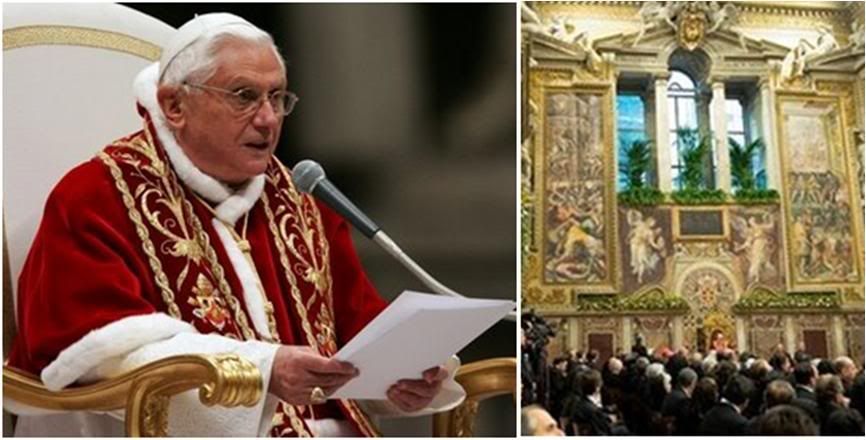
I ask political leaders on the national and international levels to take every measure necessary to resolve the current conflicts and to put an end to the injustices which caused them.
I express my hope that in Somalia the restoration of the State will finally make progress, in order to end the interminable sufferings of the inhabitants of that country.
In Zimbabwe, likewise, the situation remains critical and considerable humanitarian assistance is needed.
The peace agreement in Burundi has brought a glimmer of hope to the region. I ask that it be applied fully, and thus become a source of inspiration for other countries which have not yet found the path of reconciliation.
The Holy See, as you know, follows with special attention the continent of Africa and is pleased to have established diplomatic relations with Botswana in the past year.
In this vast panorama embracing the whole world, I wish likewise to dwell for a moment on Latin America. There too, people desire to live in peace, liberated from poverty and able freely to exercise their fundamental rights.
In this context, the needs of emigrants need to be taken into consideration by legislation which would make it easier to reunite families, reconciling the legitimate requirements of security with those of inviolable respect for the person.
I would also like to praise the overriding commitment shown by some governments towards re-establishing the rule of law and waging an uncompromising battle against the drug trade and political corruption.
I am pleased that, thirty years after the start of the papal mediation between Argentina and Chile concerning their dispute over the southern territories, those two countries have in some way sealed their desire for peace by raising a monument to my venerable predecessor, Pope John Paul II.
I hope, moreover, that the recent signing of the Agreement between the Holy See and Brazil will facilitate the free exercise of the Church’s mission of evangelization and further strengthen her cooperation with the civil institutions for an integral human development.
For five centuries the Church has accompanied the peoples of Latin America, sharing their hopes and their concerns. Her Pastors know that, to favour the authentic progress of society, their proper task is to enlighten consciences and to form lay men and women capable of engaging responsibly in temporal affairs, at the service of the common good.
Turning lastly to the nations which are nearer at hand, I wish to greet the Christian community of Turkey, while recalling that, during this special Holy Year marking the two-thousandth anniversary of the birth of the Apostle Paul, numerous pilgrims are making their way to Tarsus, his native city, a fact which once more indicates how closely this land is linked to the origins of Christianity.
The hope of peace is alive in Cyprus, where negotiations for a just solution to problems associated with the division of the Island have resumed.
As for the Caucasus, I wish to affirm once more that the conflicts involving the states of the Region cannot be settled by recourse to arms; and, in thinking of Georgia, I express my hope that all the commitments subscribed to in the ceasefire of last August – an agreement concluded thanks to the diplomatic efforts of the European Union – will be honoured, and that the return of the displaced to their homes will be provided for as quickly as possible.
Finally, with regard to the Southeast of Europe, the Holy See pursues its commitment to stability in the region, and hopes that conditions will continue to be created for a future of reconciliation and of peace between the populations of Serbia and Kosovo, with respect for minorities and commitment to the preservation of the priceless Christian artistic and cultural patrimony which constitutes a treasure for all humanity.
Ladies and Gentlemen, at the conclusion of this overview which, due to its brevity, cannot mention all the situations of suffering and poverty close to my heart, I return to my Message for the celebration of this year’s World Day of Peace. There I recalled that the poorest human beings are unborn children (No. 3).
But I cannot fail to mention, in conclusion, others who are poor, like the infirm, the elderly left to themselves, broken families and those lacking points of reference.
Poverty is fought if humanity becomes more fraternal as a result of shared values and ideals, founded on the dignity of the person, on freedom joined to responsibility, on the effective recognition of the place of God in the life of man.
In this perspective, let us fix our gaze on Jesus, the lowly infant lying in the manger. Because he is the Son of God, he tells us that fraternal solidarity between all men and women is the royal road to fighting poverty and to building peace.
May the light of his love illumine all government leaders and all humanity! May that light guide us throughout this year which has now begun! I wish all of you a happy New Year.

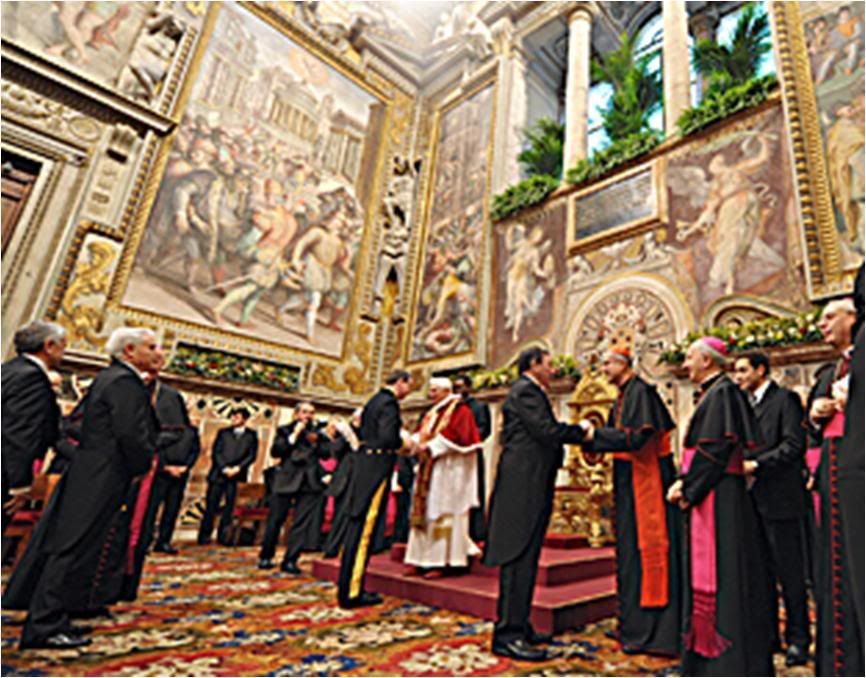 BOTSWANA IS THE 177TH NATION
BOTSWANA IS THE 177TH NATION
TO ESTABLISH TIES WITH THE HOLY SEE
Translated from

January 8, 2009
On November 4, 2008. the Holy See established displomatic relations with the Republic of Botswana - at the level of an Apostolic Nunciature on the part of the Holy See, and an Embassy on the part of Botswana.
There are now 177 states who have full diplomatic relations with the Holy See.
In addition,it also has relations with the European Community as an organization and with the Sovereign Order of Malta, and with two missions of a special character: that of the Russian Federation, which is led by an Ambassador; and an office of the Palestinian Liberation Organization (PLO). [Strange that the relations are with an organization such as the PLO, rather than with the Palestinian Authority which is the government of the putative Palestinian state.]
As far as international orgganizations, the Holy See is an 'observer state' at the United Nations, as well as a member of 7 organizations or agencies within the UN system, an observer in 8 others, and a member or observer in 5 regional organizations.
In 2008, the Holy See signed an agreement with the Principality of Andorra which regulates the following areas: the position of the Bishop of Urgell, the juridical status of the Catholic Church in Andorra, canonical marriage, religious instruction in schools, and the Church's economic system in Andorra. The two states exchanged the Instruments of Ratification at the Vatican on December 12.
On May 29, the Holy See also exchanged Instruments of Ratification wit the Republic of the Philippines on an agreement signed in April 2007 regarding the cultural assets of the Catholic Church in the Philippines. [For example, the 17th- and 18th-century colonial churches built by the Spaniards in northern Philippines have been declared a UNESCO world cultural heritage.]
On November 13, the Holy See signed an agreement with Brazil regulating the status of the Catholic Church in the country, recognition of degrees granted by Cath9olic schools, canonical marriage and the Church's fiscal regime.
Finally, on December 18, the Holy See signed an agreement with France on the mutual recognition of degrees and diplomas granted by their respective institutions of higher learning.
[Modificato da TERESA BENEDETTA 10/01/2009 18:58] |
 08/01/2009 14:43 08/01/2009 14:43 |
|
| | | OFFLINE | | Post: 16.199 | Registrato il: 28/08/2005
| Utente Gold | |
|
 Pope to send two messages
Pope to send two messages
to World Meeting of Families

Mexico City, Jan 7, 2009 (CNA)- The organizing committee of the Sixth World Meeting of Families which will open in Mexico City on January 14 announced that Pope Benedict XVI will send two messages to the participants of this historic event.
Organizers aid the Holy Father will send his first message which will be read at the beginning of the Meeting, and his second will be sent live via satellite during the closing Mass on January 18.
“Everything is almost ready to welcome the almost 30 cardinals and 200 bishops who will come from all parts of the world and have confirmed their attendance,” officials added.
The World Meeting of Families can be followed online at www.emf2009.com
which posts material in Spanish and in English.
[Modificato da TERESA BENEDETTA 08/01/2009 14:45] |
 08/01/2009 17:03 08/01/2009 17:03 |
|
| | | OFFLINE | | Post: 16.201 | Registrato il: 28/08/2005
| Utente Gold | |
|
 I am preparing to translate a couple of items from the Italian media about this, but meanwhile, this Reuters story gives some idea of how once again, Cardinal Martino, who has had a reputation for years as a 'loose cannon' with the media - even on matters not within his competence - has, in the words of Sandro Magister, 'tossed a Molotov bomb right at the feet of the Pope'!
Vatican-Israel ties tense
I am preparing to translate a couple of items from the Italian media about this, but meanwhile, this Reuters story gives some idea of how once again, Cardinal Martino, who has had a reputation for years as a 'loose cannon' with the media - even on matters not within his competence - has, in the words of Sandro Magister, 'tossed a Molotov bomb right at the feet of the Pope'!
Vatican-Israel ties tense
over cardinal's camp comment
By Philip Pullella

VATICAN CITY, Jan 8 (Reuters) - Relations between the Vatican and Israel grew tense on Thursday when the Jewish state condemned an aide to Pope Benedict for calling Gaza "a big concentration camp".
Israel criticized Cardinal Renato Martino as the Pope delivered a speech to diplomats in which he spoke out against the use of violence by both Israel and Hamas Islamists in Gaza.
On Wednesday, Martino, president of the Vatican's Council for Justice and Peace, delivered the Vatican's toughest criticism of Israel since its offensive in the Palestinian-ruled enclave, calling Gaza a "big concentration camp". [Mr. Pulella should know - and would know - that individual cardinals do not speak for 'the Vatican' about the political and diplomatic positions of the Holy See - only the Secretariat of State and its authorized officials can do that. Even the Pope limits himself to general statements.]
"We are astounded to hear from a spiritual dignitary words that are so far removed from truth and dignity," Israeli Foreign Ministry spokesman Yigal Palmor told Reuters.
"The vocabulary of Hamas propaganda, coming from a member of the College of Cardinals, is a shocking and disappointing phenomenon," he said.
The row over Martino's remark as well as Israel's bombing of Gaza have cast a shadow over negotiations for the Pope to visit the Holy Land in May, a trip some diplomats say is now in doubt.
The exchange of accusations heated up as the pope delivered his yearly "state of the world" speech to diplomats in which he seemed a pains to be even-handed following the furore over Martino's remarks.
The Pontiff lamented "a renewed outbreak of violence provoking immense damage and suffering for the civilian population" in Gaza and Israel and urged "the rejection of hatred, acts of provocation and the use of arms".
"Violence, wherever it comes from and whatever form it takes, must be firmly condemned".
More than 660 Palestinians have been killed since Israel started bombarding Gaza on Dec. 27 with the aim of halting Hamas rocket attacks. Eleven Israeli soldiers have died and three Israeli civilians have been killed since the offensive began.
The Simon Wiesenthal Center also denounced Martino and compared him to a Holocaust denier.
"These remarks are untrue, distort the memory of the Holocaust and are only used against Israel by terrorist organizations and Holocaust deniers," said Rabbi Marvin Hier, dean of the center.
In a follow-up interview in Italy's La Repubblica newspaper on Thursday, Martino defended his comments, saying the people of Gaza "are surrounded by a wall that is difficult to breach, in conditions that go against human dignity". [The cardinal is as usual 'mis-speaking'. There is no wall surrounding Gaza (which, by the way, borders on the Mediterranean), although there is a security fence that separates part of Israel from the West Bank]
Martino said "certainly, the rockets of Hamas are not confetti. I condemn them," but forcefully criticised Israel for an attack on a U.N. school. [Which UN officials were irresponsible to keep open after the hostilities began , when it was being used by Hamas militants! What responsible person would send children to school anyway in the middle of active conflict? Israeli soldiers would have assumed the children were kept home.]
Here's a translation of what Sandro Magister had to say about it in his blog today:
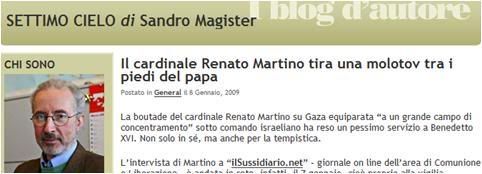 Cardinal Martino tosses a Molotov bomb
Cardinal Martino tosses a Molotov bomb
at the feet of the Pope
by SANDRO MAGISTER

January 8, 2009
Cardinal Renato Martino's boutade* comparing Gaza to a 'huge concentration camp' under Israeli command was the worst service to Benedict XVI. Not only for the remark itself, but for its inopportunity.
[*Magister deliberately uses the French word, which even in English is defined as "An impulsive, often illogical turn of mind: bee, caprice, conceit, fancy, freak, humor, impulse, megrim, notion, vagary, whim, whimsy. Idioms: bee in one's bonnet." In the past three years, he has written a couple of articles at least for www.chiesa bemoaning Cardinal Martino's foot-in-mouth propensities.]
The interview given by Martino to ilSussidiario.net, the online journal of Comunione e Liberazione in the Rome area - went online yesterday, January 7, on the very eve of the Pope's annual New Year's reception for the diplomats accredited to the Holy See.
The result is that Martino's words not only overshadow the Pope's own words today, but would appear to confirm the idea that the actual thinking of the Vatican is not the moderate and measured position of official diplomacy but the 'brutally candid' positions formulated by Martino.
In his address to the diplomatic corps today, this is what Benedict VXI said about the current conflict raging in the Holy Land:
The birth of Christ in the lowly stable of Bethlehem leads us naturally to think of the situation in the Middle East and, in the first place, in the Holy Land, where, in these days, we have witnessed a renewed outbreak of violence provoking immense damage and suffering for the civilian population.
This situation further complicates the quest for a settlement of the conflict between Israelis and Palestinians, something fervently desired by many of them and by the whole world.
Once again I would repeat that military options are no solution and that violence, wherever it comes from and whatever form it takes, must be firmly condemned.
I express my hope that, with the decisive commitment of the international community, the ceasefire in the Gaza strip will be re-established – an indispensable condition for restoring acceptable living conditions to the population –, and that negotiations for peace will resume, with the rejection of hatred, acts of provocation and the use of arms.
It is very important that, in view of the crucial elections which will involve many of the inhabitants of the region in coming months, leaders will emerge who can decisively carry forward this process and guide their people towards the difficult yet indispensable reconciliation.
This cannot be reached without the adoption of a global approach to the problems of these countries, with respect for the legitimate aspirations and interests of all parties.
These words conform to the canons of Vatican diplomacy in this area - both in the things it says, as well as in those unsaid, as we analyzed a few days ago in the article "In Gaza, the Vatican raises the white flag".
Avvenire picked up the arguments in that article and discussed some of its themes in editorials that appeared to days in a row, written by Andrea Lavazza (in the Jan. 7 and Jan. 8 issues of the Italian bishops' newspaper), which very helpfully clarify the true positions of the Church on the Israel-Palestine issue.
Prof. Giorgio Israel wrote an article posted today in ilsussidiario.net to correct the many mis-statements Cardinal Martino made in his interview, and of course, as a Jew, to answer the cardinal's arguments. I will post the translation in the CULTURE&POLITICS thread, where I have posted previous items about the Gaza conflict in general, including Magister's article that he refers to on his blog.
In fairness to Cardinal Martino, this CNS story by Carol Glatz based on his interview with Il Sussidiario shows he also found fault with Hamas. But his 'concentration camp' metaphor - implying that Israel was responsible for such a condition - was definitely out of place, given that Hamas has been fully in control of the Gaza Strip since they forcibly evicted Palestinian Authority President Abbas and his Fatah supporters from the Gaza Strip. And of course, the Cardinal continues to be quite cavalier about some of his supposed 'facts'!
Gaza Strip resembles
a concentration camp,
says top Vatican official
By Carol Glatz

VATICAN CITY, Jan. 8 (CNS) - The Gaza Strip increasingly is looking like "a big concentration camp" while egoism, hatred, poverty and injustice are fueling the continual slaughter in the Holy Land, said a top Vatican official.
"We are seeing a continual massacre in the Holy Land where the overwhelming majority has nothing to do with the conflict but it is paying for the hatred of a few with their lives," said Cardinal Renato Martino, head of the Pontifical Council for Justice and Peace, in a Jan. 7 interview in the Italian online newspaper Il Sussidiario. [The problem is he does not say who he means by 'the hatred of a few' - in this context, it can only be Hamas, because Israel has certainly never acted out of hatred! The only hatred - expressed in as many ways as they can - is on the part of the Palestinian extremists and their masters in Iran who have all vowed repeatedly - and mean it - that Israel must be eliminated!]
Israel's foreign ministry spokesman, Yigal Palmor, criticized Cardinal Martino's comments, saying they "seem to have come directly from Hamas propaganda" and did nothing "to help bring people closer to the truth and peace."
By saying the Gaza Strip resembled a concentration camp, the cardinal was ignoring "the unspeakable crimes" committed by the Palestinian militant group Hamas, he said in a Jan. 7 interview with Agence France-Presse.
Palmor said Hamas "has derailed the peace process and has turned the Gaza Strip into a giant human shield."
In an interview with the Italian newspaper La Repubblica Jan. 8, Cardinal Martino defended his description of the Gaza Strip, saying those who criticized his remarks "can say what they want. The situation in Gaza is horrible." [It was already horrible before the Israeli offensive, which has, of course, aggravated it, but certainly did not create it.]
"I say, look at the conditions of the people who live there. S urrounded by a wall that is difficult to cross -- in conditions (that are) contrary to human dignity. What has been happening recently there is horrifying," he said. [Gaza is not surrounded by a wall! For one thing, it is fully bounded on the west by the Mediterranean! Martino must be referring to the security fence that Israel built to minimize terrorist incursions from the West Bank! Cardinals, more than journalists even, have a responsibility to be truthful, to say the least.]
He said there was nothing in his comments "that may be interpreted as anti-Israeli" and he condemned Hamas's use of violence against Israel.
But he lamented the deaths of so many Palestinian civilians and children and the destruction of nonmilitary targets by Israel, suggesting such losses could have been avoided given that Israeli forces have sophisticated surveillance "technology that can let them identify an ant on the ground." [Your Eminence, there is no airborne technology yet with X-ray vision capable of seeing through roofs and walls to find out what is within. If rockets or guns are being shot against the Israelis from any building in the warzone, they would be fooolish not to assume the building had militants who are trying to kill them, and who thus become legitimate targets. This is war, after all, even if not formally declared and not between states!]
Both Israeli and Palestinian leaders have done reproachable things, he said, but "Israel has the right to live in peace, (and) the Palestinians have the right to have their own state."
"Israel certainly has the right to defend itself and Hamas must keep that in mind," he added.
"I am not defending Hamas: If they want a home, if they want a Palestinian state, they have to understand that the path they have set out upon is wrong," said the cardinal.
He said both Israelis and Palestinians are at fault for not doing enough to stop the fighting and start peace talks. [Please explain how one can sit down and talk peace with people who repeatedly vow they will not stop until they have wiped Israel off the face of the earth!]
In the Jan. 7 interview with IlSussidiario, Cardinal Martino said: "If they are unable to come to an agreement then someone else had better feel an obligation to do it for them. The world cannot sit and watch and do nothing." [Easy enough to make self-righteous statements, Cardinal. You can't say that men of goodwill, leaders of good will from the West, have not been trying everything for decades to encourage peaceful coexistence in the Middle East, with a just solution for both Israel and Palestine! Unfortunately, Palestinian politics appears to have been hijacked by the terrorists, and when has anyone ever been able to talk reason with extremists? That is the scourge that terrorism has spawned in the world - the tyranny of sheer unbridled hatred that is completely impervious to reason.]
He called for an "international intervention force" to stop the fighting.
The reason Palestinians and Israelis have so far not been able to end the conflict and begin dialogue is because there is an acute lack of respect for human dignity, he said. [He is hallucinating! There is no dialog, because one side now insists "My way or no way at all" - but 'my way' in this case is to annihilate Israel.]
"No one recognizes the interests of the other but only one's own. However, the consequences of egoism are hatred toward others, poverty and injustice, and the defenseless are always the ones who pay," he added.
Nearly 700 Palestinians, including 300 civilians, have been killed since Israel began its attacks on Gaza Dec. 27 to root out Hamas. [I hate to sound cynical, but isn't it possible that Hamas has so brainwashed many Palestinians how 'glorious' it is to die for the terrorist cause that many of the civilian casualties may have been spared if they did as people of common sense do and got out of the way of the fighting? Even some United Nations officials are apparently so irresponsible as to keep a school open in the middle of the fighting! Come on! They surely did not expect Israeli troops to be armed only with water pistols and not shoot back at a building from which they are being shot at!]
The fighting has made access to basic needs even more difficult, as food, medicine and other relief items already were lacking due to an 18-monthlong Israeli blockade of the Gaza Strip, said a Jan. 5 press release by Caritas Internationalis, an umbrella group of Catholic aid agencies.
Meanwhile, in his annual address to diplomats Jan. 8, Pope Benedict XVI appealed for an immediate cease-fire in Gaza and the resumption of negotiations between Palestinians and Israelis, with the support of the international community.
"Once again I would repeat that military options are no solution and that violence, wherever it comes from and whatever form it takes, must be firmly condemned," he said.
He said a cease-fire is "an indispensable condition for restoring acceptable living conditions to the population."
He urged both sides to resume negotiations and agree to "the rejection of hatred, acts of provocation and the use of arms."
[Dear Pope Benedict, may your prayers work, and the prayers of everyone who wants an end to this violence.
For a long time now, I can only pray - especially when meditating the third joyous mystery - "Lord, enlighten all those who need it in the land of your birth, and put an end to all the needless death and suffering. I will never understand why things are the way they are and have been for 60 years now, but you must have your reasons for why it is so. Thy will be done! But may it be an end to all this now!"
The situation reminds me of what the Holy Father and Cardinal Kasper have said so often about the prospects for Christian unification - "It does not depend on our efforts. It will come when the Holy Spirit wills it." (The obvious difference, of course, is that no one is dying from the ecumenical efforts!)
It's the best we Christians can tell ourselves about the inexplicably difficult and seemingly impossible. It may be the only realistic way (or as it is often said, 'philosophically') to deal with the Middle East standoff
[Modificato da TERESA BENEDETTA 09/01/2009 06:45] |
 09/01/2009 04:05 09/01/2009 04:05 |
|
| | | OFFLINE | | Post: 16.204 | Registrato il: 28/08/2005
| Utente Gold | |
|
 Israeli ambassador 'cool'
Israeli ambassador 'cool'
about Cardinal Martino's remarks

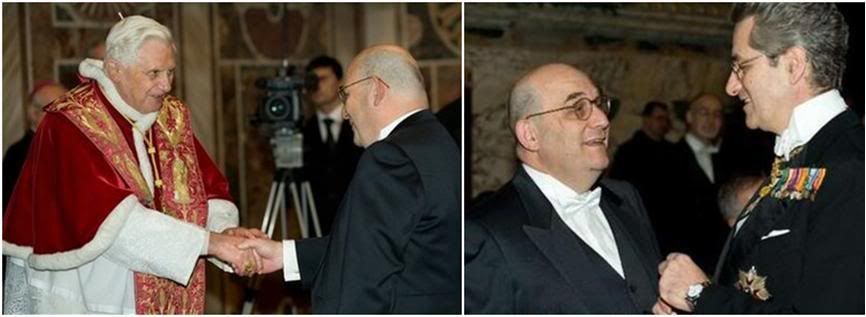 Left, the Pope greets Israeli Ambassador Mordechai Lewy, who is also shown at right speaking to Italian Ambassador Antonio Zanardi Landi,
Left, the Pope greets Israeli Ambassador Mordechai Lewy, who is also shown at right speaking to Italian Ambassador Antonio Zanardi Landi,
at the Vatican reception Thursday..
Vatican City, January 8 (ANSA English service) - The Israeli ambassador to the Holy See on Thursday downplayed tensions between Israel and the Vatican after Pope Benedict XVI's pointman for peace and justice, Cardinal Renato Martino, likened Gaza to 'a big concentration camp'.
Ambassador Mordechai Lewy dismissed Martino's comments, saying that the cardinal was not in charge of the Vatican's diplomatic relations and had "never seen a concentration camp in his life". [ In the Italian version of this story, ANSA also quotes the ambassador as commenting that Martino's remarks were 'over the top'.]
"The relationship between Israel and the Vatican is as good as before," Lewy said.
He praised the Pope for condemning violence in Gaza and appealing to both sides for peace in his traditional New Year's address on Thursday.
Lewy added that a hope voiced by the Pope that upcoming elections in the Middle East would produce leaders capable of taking the peace process forward was not a criticism of current leaders nor aimed exclusively at Israel, where elections are due on February 10.
''There are elections coming up in other countries, such as Iran,'' he said.
Lewy also confirmed that Pope Benedict XVI would be 'welcome' if he decides to go ahead with a visit to the Holy Land that was being planned before Israel began its military offensive in Gaza 12 days ago.
According to leaks from both Israel and the Vatican the visit had been scheduled to take place in May.
"The Vatican will decide if and when the trip will take place, but there is still time," Lewy said.
Martino angered Israel on Wednesday by calling Gaza
a 'big concentration camp' in which the 'defenceless population' paid for 'the consequences of selfishiness'.
Israel responded by accusing Martino of using the same kind of language as Hamas.
On Thursday Martino defended his comments.
"They can say what they want, but the situation in Gaza is horrible - people are living in conditions that offend human dignity," he told daily La Repubblica. [Which is not Israel's fault! Hamas has been fully in charge there.]
''There was nothing that could be interpreted as anti-Israeli in my words,'' he said. ''Hamas's rockets are certainly not sugared almonds. I condemn them. Both sides have to shoulder the blame''.
Ambassador Lewy's reaction should douse the flames that media anticipated, as in Richard Owen's story below, which appears to follow the line that MSM had decided to take, and would seem to have been overtaken now by Ambassador Lewy's remarks.
.
'Concentration camp' remark
threatens Pope's visit to Israel
by Richard Owen in Rome

Jan. 9, 2009
A diplomatic row between Israel and the Vatican cast doubt over Pope Benedict XVI’s planned visit to the Holy Land yesterday, after a prominent cardinal said that Gazans were living in a “big concentration camp”.
In his annual speech to diplomats in the Vatican, the Pope sought to damp down the dispute. He said that the war was “provoking immense damage and suffering for the civilian populations” in Gaza and Israel.
He urged “the rejection of hatred, acts of provocation and the use of arms” and added: “Violence, wherever it comes from and whatever form it takes, must be firmly condemned. The military solution is never an option,” he said.
His remarks came amid outrage from Israelis over a statement by Cardinal Renato Martino, the head of the Vatican Council for Justice and Peace and a former Holy See envoy to the United Nations, who compared Gaza to a concentration camp. The cardinal criticised Israel for killing civilians who had taken shelter at a UN-run school in Gaza.
Israeli officials said that they were “deeply shocked that a man of religion is using the vocabulary of Hamas propaganda”. The Simon Wiesenthal Centre, which monitors antiSemitism and hunts down Nazi war criminals, said that Cardinal Martino had used the language of a “Holocaust denier”.
In his remarks to the Italian website Il Sussidario, Cardinal Martino, one of the Pope’s closest aides, said: “Defenceless populations are always the ones who pay. Look at the conditions in Gaza: more and more, it resembles a big concentration camp.”
He condemned Hamas’s rocket attacks on Israel, saying they were “not confetti” and that Israel “certainly has the right to defend itself”.
But he added: “We need willingness from both parties because both are guilty. No one sees the interests of the other, only their own benefit. The consequences of this egoism is hatred for others, poverty and injustice. Those who pay are always the local people – just look at the conditions in Gaza.”
He responded to Israeli protests by saying: “They can say what they want. I say look at the conditions in which people live; conditions that run contrary to human dignity. What is happening in these days causes horror.”
The row has brought to the surface festering tensions over a range of issues, including plans by the Pope to beatify Pope Pius XII, the wartime Pontiff accused by critics of failing to speak out in defence of Jews during the Nazi Holocaust.
The Vatican insists that Pius XII helped Jews while avoiding public statements that would have made matters worse, and has demanded the removal of a plaque attacking Pius XII at the Yad Vashem Holocaust memorial in Jerusalem.
Vatican officials also charge Israel with failing to keep promises to ease travel restrictions on Arab-Catholic clergy and remove taxes on Church-owned property in the Holy Land.
Diplomats said that although plans for Pope Benedict’s trip to Israel, Jordan and the West Bank in May were well advanced, they had now been put on hold. He had hoped to follow in the footsteps of Pope John Paul II, who in 2000 prayed at the Wailing Wall.
Rabbi Marvin Hier, the Dean of the Simon Wiesenthal Centre, said that Cardinal Martino’s remarks were “untrue, distort the memory of the Holocaust and are only used against Israel by terrorist organisations and Holocaust deniers.
“The cardinal should know that however difficult conditions may be in Gaza, the one thing it surely is not is a concentration camp where Jews were brought to die by slave labour, starvation, or in most cases, burnt in the crematorium.”
The New York Times not only got a reaction from Ambassador Lewy on its own - it also had a reaction from Fr. Lombardi 'downplaying' Cardinal Martino's remarks. But it still led with the MSM line:
Israel condemns cardinal’s
‘concentration camp’ remarks
By RACHEL DONADIO

Published: January 8, 2009
ROME — Tensions rose between the Vatican and Israel on Thursday after Israel condemned a high-ranking Vatican official for comparing the Gaza Strip to “a concentration camp.”
"Look at the conditions in Gaza: more and more, it resembles a big concentration camp,” Cardinal Renato Martino, the president of the Council for Justice and Peace, said in an interview published Wednesday in an online publication.
He defended his comments in the center-left daily newspaper La Repubblica on Thursday. While noting that Hamas rockets into Israel were “certainly not sugared almonds,” he called the situation in Gaza “horrific” and said conditions there went “against human dignity.”
Israel on Thursday harshly condemned the cardinal’s use of World War Two imagery. “We are astounded that a spiritual dignitary would have such words, that are so far removed from truth and dignity,” said Yigal Palmor, a spokesman for the Israeli Foreign Ministry.
He added that it was “shocking to hear the vocabulary of Hamas propaganda coming from a member of the church.” But he denied that it would cause a diplomatic crisis. It “doesn’t change the nature of relations between Israel and the Holy See,” Mr. Palmor said.
The Vatican sought to downplay the cardinal’s remarks. The Vatican spokesman, Rev. Federico Lombardi, called Cardinal Martino’s choice of words “inopportune,” and said they created “irritation and confusion” more than illumination. [That's as close to a reprimand as could be made about a cardinal who heads two Vatican dicasteries! He's due for canonical retirement in March, BTW.]
While calling the cardinal “an authoritative person,” Rev. Lombardi added that “The more authoritative voice and line would be that of the Pope.” [i.e., The cardinal does not speak for the Vatican].
Indeed, the cardinal’s remarks overshadowed an important discourse that Pope Benedict XVI delivered on Thursday, in which he called for a ceasefire in Gaza and decried “a renewed outbreak of violence provoking immense damage and suffering for the civilian population.”
“Once again I would repeat that military options are no solution and that violence, wherever it comes from and whatever form it takes, must be firmly condemned,” he told diplomats accredited to the Vatican.
In unusually direct remarks, the Pope looked ahead to “crucial elections” coming up in the Middle East and called for dialogue between Israel and Syria, the “strengthening of institutions” in Lebanon and a “negotiated solution” to “the controversy surrounding” Iran’s nuclear program.
Israel’s ambassador to the Vatican, Mordechay Lewy, said events Gaza had “no connection” to plans underway for Benedict to visit Israel, the West Bank and Jordan this spring. The Vatican has not yet officially announced the trip.
In the past, some Jews have seen the Vatican’s approach as more sympathetic to Palestinian suffering than Israeli security. Mr. Lewy called the Pope’s speech “equivocal.”
“ The language and the expectations of the Holy Father and the scope of his interests are different from those of a politician,” Mr. Lewy said. “In practical politics, I’m sure Israel wouldn’t have existed if we would have acted without any force.” [How welcome it is to hear from someone who does not just say the usual platitudes!]
[Modificato da TERESA BENEDETTA 09/01/2009 04:45] |
 09/01/2009 14:44 09/01/2009 14:44 |
|
| | | OFFLINE | | Post: 16.207 | Registrato il: 28/08/2005
| Utente Gold | |
|

January 9
St. Mitiades, Pope
OR today.
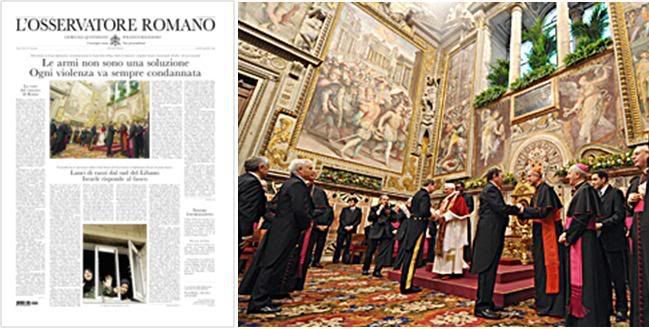
Benedict XVI to the Vatican diplomatic corps:
'Arms are not a solution; every violence must be condemned'
Page 1 also contains an editorial about the Pope's speech (translated in the post below), and a story on the rocket
attacks into northern Israel from Lebanon. The inside pages contain some articles about the emergency in
the Italian educational system.
THE POPE'S DAY
The Holy Father met today with
- Cardinal Zenon Grocholewski, Prefect of the Congregation for Catholic Education (Seminaries
and Institutes of Study)
- Mons. Nikola Eterović, Secretary-General of the Bishops' Synod
- H.E. Gábor Erdődy, Ambassador from Hungary, farewell visit
- H.E. Geoffrey Kenyon Ward, Ambassador from New Zealand, farewell visit
- H.E. Mme. Vera Barrouin Machado, Ambassador from Brazil, farewell visit
- Prof. Giovanni Maria Flick, President of Italy's Constitutional Court, and family.
Cardinal Ennio Antonelli, President of the Pontifical Copuncil for the Family, briefed the media on
the VI World Encounter of Families in Mexico City on Jan. 13-18.
[Modificato da TERESA BENEDETTA 09/01/2009 19:32] |
 09/01/2009 19:31 09/01/2009 19:31 |
|
| | | OFFLINE | | Post: 16.211 | Registrato il: 28/08/2005
| Utente Gold | |
|
 The voice of the Bishop of Rome
The voice of the Bishop of Rome
Editorial
by Giovanni Maria Vian
Translated from
the 1/9/09 issue of

Benedict XVI's address to the Vatican diplomatic corps was realistic and concrete - an overview of the world situation which is difficult to see elsewhere.
It confirmed once more the unique point of view and authoritativeness of the Bishop of Rome, who can evoke - not with a cold bureaucratic listing of the world's crisis points - the human situations that the Church, true expert in humanity, is most concerned about.
From the sufferings caused by natural catastrophes to those that are the consequences of national or regional conflicts.
It will be easy for the editors of information outlets around the world - if they are equal to their task - to find in the Pope's words a very concrete attention to individual situations that daily concern millions of men and women every day.
Above all, the situation in the Holy Land, which has been a place of conflict for decades, and about which Benedict XVI has repeated yet again that the military option is not a solution and that every violence must be condemned.
That he was not merely saying ritual words was evident in his reference to upcoming elections in the region for both Israel and Palestine, and the support he expressed for the dialog between Syria and Israel.
In the same way, the realism of the Holy See, in the Mideast panorama, looks to the reconstruction of Iraq in which there will be no ethnic or religious discrimination, and, to negotiations on the Iranian nuclear program. In Asia, the urgency of insisting on negotiations and treaties - with the Muslim rebels of southern Philippines, between Beijing and Taipei, in Sri Lanka - and in the central parts of the continent (India and Pakistan), the need for legislation that can guarantee religious freedom.
And Africa, often overlooked by the international media, is very much present in Vatican diplomacy, above all because of the tragedies of poverty and refugees (in Somalia, Darfur, the Democratic Republic of the Congo), but also for the political crisis in Zimbabwe, in contrast to the new hope for the nation of Burundi.
The desire for peace and the conquest of poverty is equally strong in Latin America, there emigration splits families, and the battle against drugs and corruption is urgent as ever, and where acknowledgment of the Catholic presence is at least widespread, as evidenced, for instance, by the recent signing of a bilateral accord between Brazil and the Holy See.
Benedict XVI, in referring to the Pauline Year, remembered the
Christian communities of Turkey and negotiations under way in Cyprus; and finally, the tensions in the Caucasus and in the Balkans.
The realism of the Holy See - daily testified to in the world by the concern for every human being on the part of Catholics - is aimed at achieving peace. A peace that seems remote for now but that can be defined - peace today means development and security.
That is why the Holy See signed the UN convention against the use of cluster bombs, why it considers the continuing arms race scandalous, why the Catholic Church's concern about the current financial and economic crisis is concrete and growing.
Forty years have passed since Paul VI's encyclicals Populorum progressio and Humanae vitae, but their teaching in defense of human life - from poverty to its manipulation for unjust ends - is unfortunately still very actual today.
That is why, even if Christian voices often disturb the dominant culture to the point of provoking persecution and intolerance, when the Bishop of Rome speaks out, his words are always awaited.
In Il Riformista today, Paolo Rodari published an interview with OR editor Vian about his editorial above:
'To get the Vatican position
on the Gaza conflict, listen to
the Secretariat of State and
what is said by Vatican Radio
and Osservatore Romano'
Interview with G.M. Vian
by PAOLO RODARI
Translated from

Jan. 9, 2009
Mr. Vian, today you have an editorial in L'Osservatore Romano in which you describe the Pope's address yesterday to the Vatican diplomatic corps as 'concrete and realistic'. In what sense?
In the sense that Benedict XVI is able to talk about the world events which most concern him by going to the core of the problems without dwelling on the superficial.
In Gaza, he does not simply call for a suspension of hostilities or the cessation of violence, but he also points out that he hopes the forthcoming elections in the region [both Israel and Palestine] will result in the election of leaders who can lead their respective peoples towards reconciliation.
Allow me to ask: is this not some sort of interference in Israeli-Palestinian affairs? [C'mon, Rodari - how can expressing a benevolent hope with such a general statement be considered 'interference' in any way? Italian MSM has cultivated this affliction of seeing the simplest, most generic statements by the Church hierarchy about anything remotely political in nature as 'interference'. It is so unreasonable as to be absurd. ]
No, it's simply realism. The Church has a very precise point of view on questions regarding the Near and Middle East. When she speaks about the situation there, it is because she thinks it is necessary for the good of all.
And it certainly is for the good of everyone that the Holy Father called attention to the responsibility of the peoples concerned in the coming elections. In his recent message for the World Day of Peace, he recalls several times that peace is in the hands of everyone concerned.
What is the position of the Holy See on the current conflict between Israel and Hamas?
It is very balanced and one can see that in the words of the Pope on New Year's Day. Speaking of the Israeli attack in Gaza, he used the term 'massive violence' in response to 'other violence'. One can say he was showing that he understood the reasons on both sides.
Israel has said that the Vatican appeared to be using the Hamas propaganda line. [It must be made clear the Israeli reaction was to what Cardinal Martino said on his own, not speaking for the Vatican; and that Israel has apparently found the Pope's speech yesterday unexceptionable.]
The line of the Holy See is what the Secretariat of State declares. One can know and understand what the Vatican thinks of various questions by checking what the Secretariat of State says officially [through statements made by Cardinal Bertone, his deputies and authorized Vatican representatives to international organizations].
This position is communicated at the diplomatic level by the pontifical representatives present in all parts of the world [the Vatican has diplomatic relations with 177 states] and by the two principal media of the Holy See; L'Osservatore Romano and Vatican Radio.
On the most urgent questions, those that require particularly emphatic intervention, then the Press Office of the Holy See directly issues the official statements.
These days, Vatican media have maintained a consistent position on the Gaza conflict: with the highest attention and concern, as well as great balance.
Your editorial implies a call on media to be 'equal to their task'...
I believe that in many countries, Western or not, media can do much more to widen their readers' horizons on world issues, contributing to the most honest information possible, as well as to the formation of persons, especially the young.
The Pope yesterday referred once again to a 'healthy secularity'? Would a society that was healthily secular accept that thousands of Muslims occupied major church piazzas to hold their prayers, as we saw last week in Milan and Bologna?
The Pope certainly was not referring to such episodes. He spoke in general, recalling what he had said about it in his recent trip to France.
True secularity is always tolerant of all beliefs and faiths, because a genuine secular attitude acknowledges what religion can offer for the good of society. Indeed, reason can appreciate the value of faith, which can enrich it. [Rodari should have pressed him more. This is a non-answer. The question was specific and concrete, and he could have given his personal opinion while making it clear he was not speaking for the Pope or the Church.]
The Pope also cited all the other difficult situations in the world today, saying that everywhere, they should be confronted always with respect for human dignity.
The Church will always defend the dignity of every human being, without excluding anyone. Benedict XVI is well aware that in many parts of the world, human dignity is simply trod upon.
[Modificato da TERESA BENEDETTA 09/01/2009 22:24] |
 09/01/2009 21:39 09/01/2009 21:39 |
|
| | | OFFLINE | | Post: 16.212 | Registrato il: 28/08/2005
| Utente Gold | |
|
 Faith by numbers:
Faith by numbers:
When Ratzinger puts on Galileo's robes
From the star of the Magi to the "intelligent structure" that governs the universe-
the Pope's reply to scientists who reject God.
A survey among mathematicians reveals that many of them are believers- some are even theologians

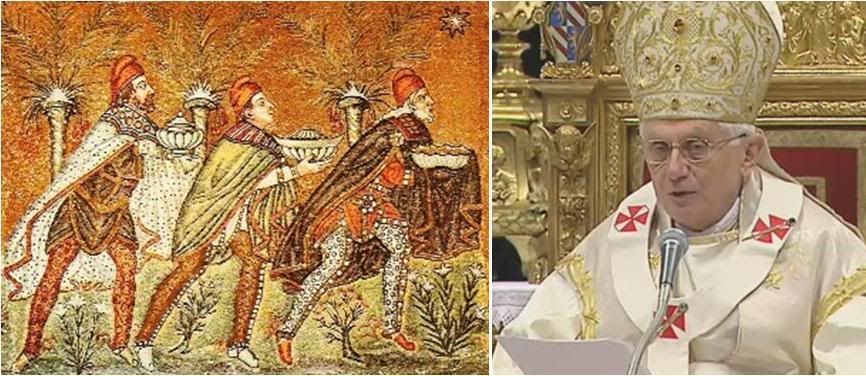
ROMA, January 9, 2008 – In his homily for the feast of the Epiphany, Benedict XVI returned to a topic very close to his heart, the relationship between faith and science.
As his point of departure, the Pope took the star of the Magi, who – he noted – "were in all likelihood astronomers," as Galileo Galilei was. But he invited his audience to look beyond a simple contemplation of the starry sky.
"The stars, the planets, the whole universe," he said, "are not governed by a blind force, they do not obey the dynamics of matter alone." Above everything, there is not "a cold and anonymous engine," but the God whom Dante described in the last verse of the Divine Comedy as "the love that moves the sun and the other stars," the God who became flesh among men, and gave them life.
In the "symphony" of creation, the Pope continued, there is a "solo" that gives meaning to everything: and this "solo" is Jesus.
2009 is the 400th anniversary of Galileo Galilei's first observations at the telescope, and will be celebrated all over the world as the year of astronomy. It will also be a year specially dedicated to Charles Darwin and to the cosmological theories that he inspired.
Pope Joseph Ratzinger gives the impression of being well prepared for this twofold appointment.
This was demonstrated in part by a key passage in the annual address that he delivered to the Roman curia last December 22:
Faith in the creator Spirit is an essential element of the Christian creed. The fact that matter carries within itself a mathematical structure, or is full of spirit, is the foundation upon which the modern natural sciences are based.
It is only because matter is structured in an intelligent way that our spirit is capable of interpreting it and of actively remodeling it. The fact that this intelligent structure comes from the same creator Spirit who also gave spirit to us brings with it a duty and a responsibility.
It is in faith concerning creation that the ultimate foundation of our responsibility for the earth is found. This is not simply our property, which we can exploit according to our interests and desires. It is, instead, a gift of the Creator who designed its intrinsic order, and in this way provided the instructions for us to consult as administrators of his creation.
The fact that the earth, the cosmos, reflect the creator Spirit also means that their rational structures that, beyond mathematical order, become almost palpable in experimentation also bear within themselves an ethical orientation.
The Spirit who shaped them is more than mathematics: he is Goodness in person, who, through the language of creation, shows us the way of the just life.
What is striking about this passage is the Pope's repeated insistence on the mathematical structure of the universe.
Mathematics, in fact, is an exact science that today is often opposed to God, as if it were his "scientific," definitive refutation.
Scientists of worldwide fame, like Richard Dawkins of England and Piergiorgio Odifreddi of Italy, insistently link mathematics with the profession of atheism. Spread through conferences, articles, and best-selling books, their theories aspire to become a common language and philosophy.
In simple terms, the objections to these atheist mathematicians are the ones expressed by a 17-year-old Roman high school student, Giovanni, during a question-and-answer session with the pope in St. Peter's Square, crowded with young people on April 6, 2006:
"Holy Father, we are often led to believe that knowledge and faith are each other's enemies; that it was through mathematical logic that everything was discovered; that the world is the result of an accident, and that if mathematics did not discover the theorem-God, it is because God simply does not exist."
Benedict XVI responded to these objections as follows:
The great Galileo said that God wrote the book of nature in the form of the language of mathematics. He was convinced that God has given us two books: the book of Sacred Scripture and the book of nature. And the language of nature – this was his conviction – is mathematics, so it is a language of God, a language of the Creator.
Let us now reflect on what mathematics is: in itself, it is an abstract system, an invention of the human spirit which as such in its purity does not exist. It is always approximated, but as such is an intellectual system, a great, ingenious invention of the human spirit.
The surprising thing is that this invention of our human intellect is truly the key to understanding nature, that nature is truly structured in a mathematical way, and that our mathematics, invented by our human mind, is truly the instrument for working with nature, to put it at our service, to use it through technology.
It seems to me almost incredible that an invention of the human mind and the structure of the universe coincide. Mathematics, which we invented, really gives us access to the nature of the universe and makes it possible for us to use it.
Therefore, the intellectual structure of the human subject and the objective structure of reality coincide: the subjective reason and the objective reason of nature are identical.
I think that this coincidence between what we thought up and how nature is fulfilled and behaves is a great enigma and a great challenge, for we see that, in the end, it is 'one' reason that links them both. Our reason could not discover this other reason were there not an identical antecedent reason for both.
In this sense it really seems to me that mathematics – in which as such God cannot appear – shows us the intelligent structure of the universe.
Now, there are also theories of chaos, but they are limited because if chaos had the upper hand, all technology would become impossible. Only because our mathematics is reliable, is technology reliable. Our knowledge, which is at last making it possible to work with the energies of nature, supposes the reliable and intelligent structure of matter.
Thus, we see that there is a subjective rationality and an objectified rationality in matter which coincide. Of course, no one can now prove – as is proven in an experiment, in technical laws – that they both really originated in a single intelligence, but it seems to me that this unity of intelligence, behind the two intelligences, really appears in our world.
And the more we can delve into the world with our intelligence, the more clearly the plan of Creation appears.
In the end, to reach the definitive question I would say: God exists or he does not exist. There are only two options.
Either one recognizes the priority of reason, of creative Reason that is at the beginning of all things and is the principle of all things – the priority of reason is also the priority of freedom –, or one holds the priority of the irrational, inasmuch as everything that functions on our earth and in our lives would be only accidental, marginal, an irrational result – reason would be a product of irrationality.
One cannot ultimately 'prove' either project, but the great option of Christianity is the option for rationality and for the priority of reason. This seems to me to be an excellent option, which shows us that behind everything is a great Intelligence to which we can entrust ourselves.
However, the true problem challenging faith today seems to me to be the evil in the world: we ask ourselves how it can be compatible with the Creator's rationality.
And here we truly need God, who was made flesh and shows us that he is not only a mathematical reason but that this original Reason is also Love. If we look at the great options, the Christian option today is the one that is the most rational and the most human.
Therefore, we can confidently work out a philosophy, a vision of the world based on this priority of reason, on this trust that the creating Reason is love and that this love is God.
Two elements stand out in the argument by Benedict XVI just cited. The first is that mathematical reasoning cannot disprove God, but it also cannot prove him. Nonetheless, it draws close to him. And it demonstrates that God is distinctly "an excellent option."
This touches upon the invitation to live "veluti si Deus daretur," as if God exists, an invitation that Ratzinger has repeatedly issued "to nonbelieving friends" as well, as Pascal did before him.
The second element is that mathematical reasoning cannot say everything about God, because God "is also Love." In the question-and-answer session with young people in 2006, Benedict XVI limited himself to simply stating this idea.
But in order to see how it is developed, all that is needed is to read his entire homily for Epiphany of this year.
The question remains: is denial of God really so widespread among scientists today, and among mathematicians in particular?
Judging by the series of interviews that Avvenire, the newspaper of the Italian bishops' conference, has been publishing for a month, the answer is no.
Avvenire is interviewing some eminent mathematicians on the topic of "Numbers and faith," meaning the compatibility between mathematical reasoning and faith in God. The picture that emerges is one of a scientific environment that is much more open to faith than the one depicted in the "vulgate" of the media.
The following mathematicians have been interviewed so far:
- on December 11, 2008, Antonio Ambrosetti, for many years a professor of mathematical analysis at the Normale di Pisa, now at the International School for Advanced Studies in Trieste;
- on December 16, Giandomenico Boffi, algebra professor at the University of Chieti and Pescara;
- on December 24, Marco Andreatta, professor of geometry and dean of the faculty of sciences at the University of Trent;
- on January 6, 2009, Giovanni Pistone, professor of probability at the Polytechnic University of Turin;
Pistone is a member of the Waldensian Evangelical Church, and holds a degree in theology, while the others are Catholic. The survey by Avvenire is limited to Italy, but the answers by the interviewees make frequent reference to other countries.
Fervent men of faith are among the other masters they cite, in particular Ennio De Giorgi, one of the most illustrious mathematicians of the twentieth century.
The survey continues. And it's an easy bet that the upcoming interviews will include Giorgio Israel, a Jewish professor of complementary mathematics at the La Sapienza University and a great admirer of Benedict XVI.
I am very grateful that Magister did this piece and went back to that extemporaneous answer that the Holy Father gave to the young student's question on faith and science in 2006. It made a very deep impression on me - though it was no surprise - that he could synthesize current concepts in mathematics, including chaos theory, so readily, effortlessly and magnificently, with the essence of God and his divine design.
It was the first time I had heard him speak about science - and how fortunate that it was an informal setting in which he oculd speak as his thoughts came to him without being constrained by time considerations or the occasion.
It reminded me then of the actual moment when I personally grasped in a concrete, direct manner, and not merely theoretically, that the laws of the universe can be and are described by mathematics, e.g., E=mc2. In my basic course in calculus and analytic geometry (at my university one took both subjects together in four semesters of exhilarating mental adventure!), one of the introductory lessons was the generation of graphs by calculating the range of values given by any algebraic equation, simple or complex - i.e., not just the lines one could generate in high-school algebra.
As we worked our way through the familiar parabolas, hyperbolas, waves and other curved lines generated by a class of equations, we soon got to a type that generates graphs in the shape of flowers - yes! regular petal-shapes clustered around the focus of the equation, with the number of petals generated depending on the parameters of the equation. The evening I generated my first 'flower' was an epiphany for me - I thought this is how Archimedes must have felt when he cried 'Eureka!' - as we had not done it in class before.
How often in the next few years I would get that sense of awesome wonder at truths made evident in physics, chemistry, anatomy, genetics, even engineering subjects like 'strength of materials' - truths which were at once very concrete but also quintessentially transcendent and luminous with their inherent significance! And learning became a religious experience in itself.
It is the same awe I feel when Benedict formulates the truths of the faith in his unique and incomparable way, and think with fleeting envy of the generations of students who benefited from his teaching, thankful that the world is now his classroom and that we are among his pupils.
[Modificato da TERESA BENEDETTA 09/01/2009 22:27] |
 09/01/2009 23:03 09/01/2009 23:03 |
|
| | | OFFLINE | | Post: 16.213 | Registrato il: 28/08/2005
| Utente Gold | |
|
 Will the Pope cancel
Will the Pope cancel
his Holy Land trip?
By Jeff Israely

Friday, Jan. 09, 2009
EEEEWWW! One of my pet peeves does it again - indulging in needless speculation that is almost an augury of ill-wishing!
Shortly after Pope Benedict XVI's election, a Vatican Cardinal close to the Pontiff predicted that a Holy Land pilgrimage would be the first or second trip on the new papal itinerary.
"It will happen soon," the Cardinal told me privately. "He very badly wants to go."
Nearly four years and 10 trips later, the visit was finally confirmed last month, even though some prickly bilateral issues between the Holy See and the Israeli government remained unresolved.
But as Israel's assault on Gaza reaches the two-week mark, Vatican diplomats now say the long-anticipated journey (with planned stops in Israel, the West Bank and Jordan) is increasingly at risk of being cancelled.
After the first rounds of air strikes on Hamas targets, chief Vatican spokesman Father Federico Lombardi had cautioned that it was "premature" to say whether the conflict would scuttle the trip.
But Church insiders now acknowledge that hopes for the planned visit are growing dimmer as the conflict deepens, with Israel's all-out air and ground assault on Gaza growing bloodier.
"At the beginning, you could imagine [the war] not forcing the Pope to change his plans," says a well-placed Vatican insider who often travels to the region. "But it's clear now that everything would have to be reconsidered for [the trip] to happen." [It so happens that many of the Vatican figures who consider themselves Holy Land experts are hostile to Israel and have always been, so I would consider their statements as expressions of their own wishful thinking.]
The Palestinian death toll has topped 700, according to U.N. and other sources in Gaza, while 11 Israelis have been killed, eight of them soldiers' [The 11 Israelis are just as dead as the 700 Palestinians - God rest all their souls and deal with their killers accordingly! If war were a simple equation of numbers, then how about putting together all the victims of massacres by Palestinian suicide bombers in Israel, say, within the past five years alone?]
Meanwhile, worldwide calls for a cease-fire — including repeated pleas from Benedict — have come to naught. On Thursday, during his annual address to the international diplomatic corps assigned to the Holy See, the Pope said that "military options are no solution and that violence, wherever it comes from and whatever form it takes, must be firmly condemned."
The Vatican has long called for a negotiated settlement and wants Israel and the U.S. to engage other regional players, including Syria and Iran, to find what the Pope on Thursday called a "global approach" to a lasting Middle East peace.
Complicating matters for the planned papal trip was a remark by Cardinal Renato Martino, head of the Vatican's Office for Justice and Peace, who likened the situation in Gaza to a "concentration camp."
Israeli Foreign Ministry spokesman Yigal Palmor responded bluntly on Thursday. "We are astounded to hear from a spiritual dignitary words that are so far removed from truth and dignity," he was quoted as telling Reuters. "The vocabulary of Hamas propaganda, coming from a member of the College of Cardinals, is a shocking and disappointing phenomenon."
The issue of the Holocaust had already been a sticking point during negotiations for a possible papal visit. Church officials have demanded that Israel remove a photograph caption at the Yad Vashem Holocaust memorial that criticizes Pope Pius XII's conduct during World War II.
Jewish leaders and some historians argue that Pius failed to use his moral power to denounce the atrocities. Catholic leaders are pushing for Pius to be made a saint of the church, saying he was one of the 20th century's great Popes and that he did what was possible during the Nazi occupation.
Benedict has given mixed signals as to whether he will forge ahead with the cause for beatification — the last step before sainthood.
The debate over these historical matters may become moot if the current conflict continues and the trip to Israel gets shelved. Less politically oriented than his immediate predecessor, Pope John Paul II, Benedict finds his comfort zone when reflecting on church history and digging into Christian theology.
Having already written during his papacy a best-selling scholarly treatise on Jesus, Benedict had envisioned his trip to the holy sites in the Middle East as above all a pilgrimage to the birthplace of his faith. Such was the case in 1964 when Pope Paul VI visited holy sites on the first papal journey to Israel, long before the Vatican and the Jewish state had established diplomatic relations.
When John Paul II went in 2000, it was a mix of pilgrimage and politics, with an inevitable emphasis on inter-religious relations.
If the violence ends soon enough and the papal trip can be salvaged, Benedict's arrival in the region would inevitably be much more political than he might have initially hoped.
"He wanted to make a voyage of faith. But the context has changed," says the Vatican source. "Now the focus would be on peace. It could give him the chance to leave a legacy there."
First, though, he must pray for the chance to even make such a complicated pilgrimage, as the Middle East's collision of faith and politics grows bloodier by the day.
[I don't know that it has been any bloodier since the first Arab war declared against the new state of Israel in 1948! At least at the time, terrorism had not yet come into being as an instrument of intimidation and political manipulation.
I still do not see the rationale behind conferring moral equivalence on terrorist aggression and legitimate self defense. Why should the initial victim of aggression (Israel in this case) be faulted because it has superior force, which it has not used unless it has to, whereas the terrorists strike when and where they please (and it's not Israel's fault that they have inferior weapons, but wait until Tehran can manage to bring in their latest sophisticated war toyx into Gaza!).
The terrorists rightly calculate the overwhelmingly favorable odds of 'playing victim' to curry world opinion - so they escalate their pinprick aggressions to provoke a response from Israel. They know full well that no matter how Israel calibrates its response to achieve a specific objective and notbing more, the terrorists could coldbloodedly and calculatingly present maximum numbers of their civilians as targets so that Israel would come out reeking of blood while the whole world oohs-and-aahs, shakes its head, and wags its fingers about their victims.
Vatican, Israel lock horns
over Gaza violence (again)
All Things Catholic

Friday, January 9, 2009
No crisis in the Middle East would be complete without a mini-drama involving alleged Vatican bias in its criticism of Israel, and as if on cue, just such a spat erupted this week.
On Wednesday, an Israeli official complained that the Vatican has swallowed "Hamas propaganda," following comments from Cardinal Renato Martino, President of the Pontifical Council for Justice and Peace, comparing the Gaza Strip to a "huge concentration camp."
"Remarks that seem based on Hamas propaganda while ignoring its numerous crimes ... do not bring the people closer to truth and peace," Israeli Foreign Ministry spokesman Yigal Palmor objected Wednesday afternoon.
To seasoned observers, it should come as no surprise that Martino is at the eye of the storm.
While most Vatican diplomats seem almost photophobic in their aversion to the spotlight, Martino has a genius for attracting attention to himself.
Readers may recall, for example, that back in 2003 Martino accused U.S. troops of treating the captured Saddam Hussein "like a cow," and said that he felt "pity" and "compassion" for the former Iraqi leader -- comments that didn't sit well with some Americans, to say nothing of victims of Saddam's regime.
To be fair to Martino, the full text of his comments on Gaza comes across as more balanced than the sound-bite cited above.
Here's what he said, in a Jan. 7 interview with the Italian Web site Il Sussidiario ("Subsidiarity"), in my translation: "The consequences of egoism are hatred, poverty and injustice. It's always the unarmed populations who pay. Look at the conditions in Gaza -- more and more, it resembles a huge concentration camp. …What's needed is will on both sides, because both are guilty. Israelis and Palestinians are sons of the same land, and they have to be separated, like you'd do with two brothers. … If they can't come to an agreement, someone else has to feel the duty to do it. The world can't stand by and do nothing."
Yet even given that context, Martino is no naïf, having spent 16 years as the Vatican's observer to the United Nations. He had to know that his reference to a "concentration camp" could not help but call to mind the crude imagery popular in Arab and Islamic extremist circles comparing Israel to Nazi Germany. Cartoons routinely show the Star of David twisted into a swastika, Israeli Defense Forces dressed up as SS storm troopers, and so on.
The comment was, therefore, the diplomatic equivalent of a poke in the eye. (That's not to mention the dubious wisdom of a Vatican official invoking the memory of World War II-era concentration camps, since the question of Christian acquiescence in the Holocaust remains a tremendously sensitive point in Christian/Jewish relations.)
This, of course, is merely the latest instance in which Israel and its supporters have complained about prejudice in the Vatican's approach to what it calls the "Holy Land" -- a linguistic convention intended to express neutrality, but taken by many Israelis as a subtle refusal to recognize the legitimacy of the Jewish state.
Back in the spring of 2002, for example, Israeli forces converged on Bethlehem in the West Bank after Palestinian gunmen occupied the Basilica of the Nativity, regarded by Christian tradition as the birthplace of Jesus.
Throughout the 40-day standoff, L'Osservatore Romano, the official Vatican newspaper, insisted upon condemning an Israeli "siege," even though the Israelis would never have been at the basilica in the first place if the Palestinians hadn't hijacked it at gunpoint.
To make matters worse, L'Osservatore accused Israel of "aggression that is tantamount to extermination," and asserted that its military was "profaning the holy sites with iron and fire."
With regard to the current crisis in Gaza and the Vatican's approach to Israeli/Palestinian relations under Benedict XVI, four points should be made in the interests of keeping the record straight:
First, the broad aim of Vatican diplomacy is to support a two-state solution that would provide stability and security for both Israelis and Palestinians.
As a result, commentary from the Holy See has been critical of violence on both sides. In his Angelus address on January 1, for example, Pope Benedict XVI affirmed "the profound desire to live in peace that stirs in the hearts of the vast majority of both the Israeli and Palestinian populations, which has one again been placed at risk by the massive violence unleashed in the Gaza Strip in response to other violence."
On Jan. 4, the pope implored "the authorities and those responsible on both sides, Israeli and Palestinian, to act immediately to put an end to this tragic situation."
Second, in the past the most egregiously anti-Israeli line from the Vatican generally came from L'Osservatore Romano under its former editor, Italian layman Mario Agnes.
A transition in leadership has meant that this time around, the tone from Vatican media has been more even-handed. A statement from Jesuit Fr. Federico Lombardi, the Vatican spokesperson, in late December on Vatican Radio offers a case in point: "Hamas is a prisoner of a logic of hatred," Lombardi said, "Israel of a logic of trusting in force as the best response to hatred." [What else can it do when the other side clearly has no use for negotiations - much less, reason - or anything else that does not result in driving Israel out of the Middle East?]
Third, Benedict XVI has been far more willing to openly challenge Muslim leaders to repudiate violence and terrorism than John Paul II, as well as to demand "reciprocity," meaning an acknowledgement of the right to religious freedom, from majority Islamic states.
Fourth, despite Martino's rhetoric, not everyone perceives an anti-Israeli tilt to Vatican commentary.
After Benedict XVI condemned the violence in Gaza on Jan. 6, a prominent Saudi commentator wrote: "The Pope could and should have been much more explicit. He should have convened a synod for Gaza, as he did for Lebanon. But he preferred to kowtow to the Jews, whatever their crimes and sins."
Having said all that, here's what drives Israelis crazy: Generally, the Vatican gets cranked up to denounce violence in the Holy Land only when it's initiated by Israel. [It's the fundamental injustice of this position that I find so inexplicable and unaceptable. And it saddens me immensely that even someone as wise as Benedict XVI appears caught up in the illogic.]]
Yes, the statements are fairly even-handed, but inevitably they feed news cycles about international condemnations of Israeli aggression. As Italian Catholic writer Sandro Magister has pointed out, there was no similar high-profile commentary from the Holy See while Hamas tightened its grip on Gaza and rained down bombs into Israel.
To explain that, it's not necessary to invoke the vestiges of medieval anti-Semitism, or the Vatican's ambivalence about the creation of the state of Israel in 1948.
Aside from a genuine conviction that political and social injustices suffered by the Palestinians [Injustices by whom? Not by the Israelis, even if they are guilty of egregious blunders like putting Israeli settlements on Palestinian territory. The injustices have mostly been by other Arab countries* who have left the Palestinians largely to fend for themselves as a refugee population for most of the past 60 years, and by the Palestinians' own leaders who have exploited their misery to play the victim card to the world more pitifully!] are the root of the problem, two sociological forces are at work:
First, Vatican diplomats, especially at the senior levels, tend to come from the same backgrounds as officials in European foreign ministries. All things being equal, they tend to share the same broadly pro-Palestinian outlook as their secular counterparts, and they're influenced by the fact that European media devote much more coverage to Israeli responses than to whatever aggression from the Palestinian side triggered it.
Second, the Vatican is understandably influenced by the Christians who actually live in the Holy Land -- the vast majority of whom are Palestinians, and often ferociously critical of Israel.
Once again this time around, local Christian leaders have voiced outrage about Israeli policy. The Latin patriarch of Jerusalem, Archbishop Fouad Twal, denounced what he describes as the "disproportionate" Israeli response.
Fr. Raed Abushalia, a former spokesperson for the Patriarchate of Jerusalem and director of the only Catholic radio network in the Holy Land, went further: "Hamas is not a monster, but a movement of resistance against the Israeli occupation of the Palestinian territories," he said. [But Israel withdrew from Gaza in 2005!] "Now more than ever, it's essential to dialogue with it in order to put an end to the tragic Israeli-Palestinian conflict." [Stop already with the "dialog' refrain! When did it ever bring anything good that lasted more than few months at the most?]
Auxiliary Bishop Giacinto-Boulos Marcuzzo of Jerusalem echoed the call for Israel to negotiate with Hamas, agreeing with Abushalia that Hamas is "a legitimately and democratically elected" party. [Even so, it is still an openly unabashedly terrorist organization dedicated to destrying Israel. That they won a parliamentary majority only means they have convinced majority of the Palestinians that the terrorist way is best. How can that be any plainer?]
In a dramatic protest of the Israeli incursion into Gaza, the Franciscans who serve as custodians of the holy sites refused to turn on the Christmas lights in Bethlehem.
For outside observers, this apparent sympathy for Hamas can be tough to understand. [YOU CAN SAY THAT AGAIN, AND YOU CAN'T SAY IT ENOUGH!]
Recent years have witnessed a steady Christian exodus out of the Holy Land, driven to a great extent by rising pressure from Islamic fundamentalists. Yet for most Palestinian Christians, it makes all the sense in the world. If Christianity is to have a future in an eventual Palestinian state, they believe, it has to share fully in the lot of the Palestinian people. [I don't follow! How can they share that lot if they allow themselves to be driven away?]
(Under the same logic, Arab Christians have long been at the forefront of nationalist and pan-Arab causes; Michel Aflaq, for example, the ideological founder of the Ba'ath movement, was born into a Greek Orthodox family in Syria.)
At the end of the day, however, the Vatican has always prided itself on its distance from local passions, which theoretically allows it to be more balanced in its assessments.
As long as even moderate Israelis sometimes strain to see that balance, it will be difficult for the Vatican to play its desired role as a neutral voice of conscience.
At the level of inter-religious relations, Benedict XVI has steered Catholicism towards a more muscular posture in condemning religiously-inspired violence, which in practice has meant a more challenging line in Catholic/Muslim dialogue; to date, critics would say that this new tone has yet to be reflected in Vatican diplomacy.
* * *
One question mark created by the crisis in Gaza is what impact it may have on Pope Benedict XVI's highly anticipated visit to the Holy Land in May. Though the Vatican has not officially confirmed the trip, local church officials have said that plans call for the pope to arrive in Jordan on May 8, and then to be in Israel May 11-15.
Tentatively, Benedict is set to celebrate Masses in Jerusalem, Nazareth and Bethlehem, visit the Holocaust memorial at Yad Vashem, and hold talks with Israeli President Shimon Peres. Officials say that Benedict will not meet representatives of Hamas. [What would be the point? Hamas would only use the Pope for propaganda purposes.]
In light of the recent violence, however, Vatican officials have warned that the trip could be in jeopardy. Lombardi recently cautioned that the visit has not been confirmed, and Martino said that the crisis has complicated the necessary advance planning.
In general, local church officials remain optimistic that calm will have been restored by May and that the trip can proceed, but it's unlikely any official announcement will be issued ahead of a peace deal.
NB: For more than 20 years as an active journalist, I had occasion to follow every development in the Middle East day by day and dispatch by dispatch, and have never left off following it afterwards. So I am not simply shooting from the hip when I comment on what is happening now. It is why I feel so driven to comment.
*As for the 'social and economic injustices' at the root of the Palestinian problem- Has anyone drawn a comparison of how much assistance the petro-gazillionaires of the Arab world have ever given to Palestinian development compared to the aid that the United States has given, for instance? Remmeber how those same gazillionaires only gave token assistance when Indonesia - the world's largest Muslim country - was hit by the tsunami!
For those who may be interested, I posted the articles on 'war' and 'just war' from the Catechism of the Catholic Church in the MAGISTERIUM thread. It's a most instructive and edifying exercise to go through the articles and apply the criteria to both sides in the Gaza conflict at present. It seems to me many of the clerics who are so free and easy with their one-sided condemnations need to read up on their catechism, too. Ther's blame on both sides, but much more blame on the other.
[Modificato da TERESA BENEDETTA 10/01/2009 06:29] |
 10/01/2009 01:48 10/01/2009 01:48 |
|
| | | OFFLINE | | Post: 16.216 | Registrato il: 28/08/2005
| Utente Gold | |
|
 Benedict XVI:
Benedict XVI:
The essence of his Pontificate
is spiritual and ecclesial
by GIANNI BAGET BOZZO
Translated from

Issue 2/2009, Jan. 8, 2009
Benedict XVI is a theologian Pope who intends to give all the acts of his Pontificate an ecclesial significance. This does not take away from - bur rather adds to - the political significance of his actions.
His trips have become an interpretation of the message that the Church addresses to the world, the one that is proper to its competence.
This was very evident during his trip to Sydney for World Youth Day, with a liturgy that became symbolized in the public mind by the Way of the Cross.
The Pope's interventions present man's body as the peak expression of creation, being the image and likeness of God. The integrity of the embryo; the link between man, woman and family; the prohibition against biological manipulation of the human body - these are the essential themes of the 'ecclesial difference' that he proposes as an alternative to the dominant culture today.
His planned trips in 2009 include a possible trip to Israel. Where the theologian Pope would confront not only the relationship of Catholicism with Jewish tradition, but also the sensitive problem of an Israeli state on largely Arab territory.
Even the United States which Benedict XVI recognizes as a model for a viable relationship between religion and politics will present problems. The new President is Christian and a supporter of the family, but he also supports freedom of choice over abortion and he will certainly name judges who have the same orientation.
And perhaps it won't be given to Benedict to travel to Russia, even though the unity of the Catholic Church with the Orthodox Churches is central in Benedict's thinking. He has replaced the perspective of ecumenism in every direction with the more focused idea of the unity of the Church as the undivided Church of both East and West, as it was in the first millennium.
Meanwhile, he has brought the Church around to contemplating the mystery which dwells in it and wants the clergy to talk the language of men of the Church who truly participate in the divine life.
Though this particular emphasis of Pope Benedict may encounter resistances in the Roman Curia itself, he has great strength in his essentiality - that Catholicism cannot face the challenge of the times without a sense of its foundation in the eternal.
At ignatius Insight, Carl Olson used that Sunday Times of London poison piece
(posted on this thread earlier) as a take-off for this:

by CARL OLSON

January 7, 2009
The Times recently carried this headline:
Crowds shrink for ‘bland’ Benedict,
the Pope who only ever says no
It's not clear why "bland" is in quotes as it only appears in the headline. Who said it? Why is it in quotes? Regardless, the rest of the news piece screed is no better:
THE crowds turning out for Pope Benedict XVI’s preachings and blessings at the Vatican are dwindling fast as the dour pontiff pays the price for his lack of charisma and visibility compared with John Paul II, his showman predecessor.
Yet another use of the old "Benedict vs. John Paul" routine — aka, "Good Pope vs. Bad Pope" — which should not be confused with a reasonable comparison of the men and their distinctive traits.
After all, there is nothing wrong with finding reasons for the change in numbers (David Gibson offers a few over on the Beliefnet blog). And, frankly, those who pointed to the huge numbers of visitors during Benedict's first year shouldn't be so defensive about the numbers dropping. They should, I think, be more annoyed (yes, as I am) about the way those numbers are used to wrongfully criticize, or even malign, the Holy Father.
You see, the mythology of a warm, huggable John Paul II vs. the mean, rigid Benedict XVI is based in part in the notion that everyone —including the Big Media and dissenting theologians and rabid anti-Catholics — simply loved and adored Pope John Paul II.
The truth is a bit more tricky and interesting, and helps make some sense of The Times' snarky criticism. Namely, the media was (especially early on) enamored with John Paul II's personality and his outgoing approach, which certainly differed from that of Pope Paul VI, who was hardly (if ever) seen during the last years of his pontificate.
For example, the October 15, 1979, issue of TIME magazine (not to be confused with The Times), dedicated to John Paul's first American visit, carried the headline: "John Paul, Superstar!" The lead article stated that the young Pope was "the kind of incandescent leader that the world so hungers for" and was "a man for all seasons, all situations, all faiths, a beguilingly modest superstar of the church..."
But although John Paul II's outgoing, energetic personality couldn't be denied, TIME noted that "the warmth inspired by the Pope's presence poses a conundrum about the man and his views." It also pointed out that John Paul could be difficult, as he was "a firmly conservative occupant of the Chair of St. Peter. One indication of his uncompromising views: the austere Pope Paul VI got 32,357 requests from priests to be released from their vows and granted all but 1,033 of them; the warmly human John Paul II has not released one."
What follows is quite fascinating, especially with almost 30 years of hindsight (by the way, I was a ten-year-old anti-Catholic fundamentalist when John Paul II came to the U.S. in 1979):
That John Paul nonetheless won the hearts — if not yet the minds — of many Americans is partly a tribute to the uniqueness of his office, one that gives him the most imposing pulpit in the world, and very largely a result of his simple humanity.
His spontaneous delight in baby kissing, in bantering with crowds, is needed proof that the head of even an enormous and tradition-bound institution can lead with affection and empathy.
There may also be a deeper reason for the reaction to the Pope: in the U.S., as in other wealthy nations, many people, vaguely uneasy about the materialism of their lives, yearn in varying degrees for higher values and are even amenable to some fatherly chiding. John Paul sensed that mood and appealed to it in every one of his U.S. addresses.
This is a Pontiff who does not pontificate, but neither does he budge from any of his stands. In Philadelphia he asserted that he would not permit the ordination of women or married men, saying it is not "traditional."
In Chicago, speaking to American bishops, he dramatically emphasized papal condemnation of birth control, divorce, abortion, extramarital sex and homosexual sex.
So, there is no doubt that John Paul II and Benedict XVI are different men, with distinctive personalities, and with contrasting approaches.
But, do they agree on the issues listed above? Was John Paul II any less staunch in his opposition to birth control, divorce, abortion, extramarital sex and homosexual sex? No, of course not.
But what the piece in The Times does is (either purposefully or not) confuses personality and belief. The subjective (Is he likeable?) and the objective (What is he teaching?) are not distinguished from one another:
Before his election as leader of 1 billion Catholics, Joseph Ratzinger, the German cardinal and theologian, had been branded “God’s rottweiler” and “the Panzerkardinal” because of his work as an enforcer of doctrine. His personality was contrasted with John Paul, known as “the Grand Communicator” because of his media-friendly skills. Visitors to the Vatican often pay tribute to John Paul. They shuffle past his tomb in the crypt of St Peter’s Basilica and postcards bearing his image still sell well.
Here's an interesting theoretical question: what if Joseph Ratzinger had been elected Pope in 1978, and Karol Wojtyla had been selected to be the head of the CDF? How might perceptions be different? How might a much younger Benedict have approached being Pope thirty years ago? Would he, for example, travelled far more?
As has been pointed out many times, one's title and position has a huge effect on how people perceive you. John Paul II, TIME magazine wrote, "asserted that the church has a special mission to 'guard and transmit intact the deposit of Christian doctrine,' thus reaffirming the thought that Christianity is a body of fixed beliefs rather than a faith that ought to be adapted to modern circumstances."
It wasn't a popular message, but many people (not all, certainly) were able to either ignore it or downplay it because of John Paul II's gregarious, fun-loving public personality.
Benedict is not dour, nor is he bland — anyone who actually pays attention to what he says and writes knows he possesses both a powerful intellect and a keen sense of dry humor. But he is certainly less outgoing than John Paul II; he is described as shy by those who know him personally; he is very warm and engaging but isn't given to the sort of dramatic public expressions sometimes used by his predecessor.
In short, because the two popes have such different personalities, critics and enemies must go after them in different ways, even though the points of contention are identical.
Those who disliked the teachings of John Paul II attacked and criticized him — but not in quite the same way that they criticize (or even mock) Benedict XVI. They don't like the papacy and the teachings of the Catholic Church — especially teachings about sexuality and related moral issues — so they act like schoolyard punks, searching for the most emotive, least reflective means of getting at him:
Vito Mancuso, a theologian critical of Benedict, linked the smaller crowds to the worldwide fall in priestly vocations and decline in church attendance. He advised Benedict, 81, to stop “saying always and only ‘no’ ”. The church needed to be more humble and doubtful about its rulings on the role of women, sexuality and bioethics, he said.
In the latest “no”, the Vatican on New Year’s Day stopped automatically adopting Italian laws because of potential “antiCatholic legislation” involving euthanasia and gay marriage. In an address to Vatican staff, Benedict said homosexuality threatened humanity as much as did rainforest destruction.
Benedict’s papacy has in the long run a polarising impact inside the Catholic world. In one camp there are those who are enthusiastic about Ratzinger’s government; in the other camp are those who aren’t attracted by it,” said Marco Politi, a Vatican watcher.
(Mancuso, if you don't know, is not just a "theological critic of Benedict," but a [lay!] theologian who has sought to dismiss or undermine nearly every basic Christian doctrine, including sin, the Incarnation, the Resurrection, and the need for salvation.)
Sure, Benedict's language is, I think it can be fairly said, sometimes more direct and blunt than that used by John Paul II. But it's not as though Evangelium vitae was a huge hit in all quarters when it came out in March 1995. Quite the contrary. And it's hardly a secret that John Paul II was a big fan of marriage involving one man and one woman, monogamous, and for life, as he made clear back in 1981:
Living in such a world, under the pressures coming above all from the mass media, the faithful do not always remain immune from the obscuring of certain fundamental values, nor set themselves up as the critical conscience of family culture and as active agents in the building of an authentic family humanism.
Among the more troubling signs of this phenomenon, the Synod Fathers stressed the following, in particular: the spread of divorce and of recourse to a new union, even on the part of the faithful; the acceptance of purely civil marriage in contradiction to the vocation of the baptized to "be married in the Lord", the celebration of the marriage sacrament without living faith, but for other motives; the rejection of the moral norms that guide and promote the human and Christian exercise of sexuality in marriage. ...
Consequently, sexuality, by means of which man and woman give themselves to one another through the acts which are proper and exclusive to spouses, is by no means something purely biological, but concerns the innermost being of the human person as such. It is realized in a truly human way only if it is an integral part of the love by which a man and a woman commit themselves totally to one another until death.
The total physical self-giving would be a lie if it were not the sign and fruit of a total personal self-giving, in which the whole person, including the temporal dimension, is present: if the person were to withhold something or reserve the possibility of deciding otherwise in the future, by this very fact he or she would not be giving totally.
This totality which is required by conjugal love also corresponds to the demands of responsible fertility. This fertility is directed to the generation of a human being, and so by its nature it surpasses the purely biological order and involves a whole series of personal values. For the harmonious growth of these values a persevering and unified contribution by both parents is necessary.
The only "place" in which this self-giving in its whole truth is made possible is marriage, the covenant of conjugal love freely and consciously chosen, whereby man and woman accept the intimate community of life and love willed by God Himself(23) which only in this light manifests its true meaning.
The institution of marriage is not an undue interference by society or authority, nor the extrinsic imposition of a form. Rather it is an interior requirement of the covenant of conjugal love which is publicly affirmed as unique and exclusive, in order to live in complete fidelity to the plan of God, the Creator.
A person's freedom, far from being restricted by this fidelity, is secured against every form of subjectivism or relativism and is made a sharer in creative Wisdom. ...
In the context of a culture which seriously distorts or entirely misinterprets the true meaning of human sexuality, because it separates it from its essential reference to the person, the Church more urgently feels how irreplaceable is her mission of presenting sexuality as a value and task of the whole person, created male and female in the image of God. (Familiaris Consortio, 7, 11, 32)
No doubt John Paul II, if he uttered those words today, would be labeled "homophobic". After all, upon his death in April 2005, the Gay and Lesbian Humanist Association said "he would go down in gay history as one of the most implacable homophobes of all time." Perhaps they meant he was a beguilingly modest homophobic superstar.
Regardless, however different in personality, both John Paul and Benedict seek to do one thing: proclaim that "[t]he Redeemer of man, Jesus Christ, is the centre of the universe and of history," as John Paul II wrote at the very start of his first encyclical.
In the recent words of his successor: "And so, the Pope is not the star around which these events take place. He is totally and only the Vicar [of Christ]. He points to the Other who is among us."
This is not about cult of personality, but about the conondrum of Christ and His question: "Who do you say I am?" And that, it seems to me, is a timeless and timely question.
I looked at what David Gibson had to say, as Olson cited him above, but don't bother! It's his usual 'damning by faint praise' unctuousness. Take this as a sample:
Of course it's true, numbers shouldn't dictate "success" in papal terms, but big crowds--like inflated real estate prices--mesmerized the Vatican, esp during the JP2 years, when the going was good. Benedict was never likely to match such figures, nor should he try. But it's not something he seems worried about, even if others are.
How can Gibson say that when the point precisely of those astounding figures in 2005 and 2006 was that they far surpassed even what John Paul registered in the Jubilee Year 2000, which was his peak year! Not as a reflection in any way on JP-II, but of something not even Joseph Ratzinger's most fervent admirers expected, and much less so by his flummoxed critics and detractors who had all but ruled out that anyone could ever hope to fill the late Pope's shoes.
Benedict's critics may cavil all they want, but those who are able to catch any satellite transmission of his events should and would see quite easily the following he attracts - and what there is in his very un-JP-II-like persona that is just as endearing and works its charm on the faithful.
Besides, most people keep forgetting the special fascination that the Pope, any Pope, is bound to inspire among the faithful who see the Pope as the Vicar of Christ. How can anyone ignore that factor?
And once again, I must note that in our upbringing before the Me generation and all the self-centered 'gens' that came after the 1960s, we were taught that age was to be respected and venerated. Sure, you may disapprove or dislike your elders but you observed some basic decorum and did not diss them in public, much less to their face.
The way MSM have treated Benedict XVI, you'd think they were dissing a 21-year-old punk star who had nothing to qualify him but his 'celebrity', a Paris Hilton, say, instead of the spiritual leader of 1.2 billion Catholics and the most compelling mind on the world scene today.
The other thing I wish people of genuine good will should remember - so that they avoid making unnecessary and invidious comparisons between the two Popes - is to thank the Lord and celebrate the fact that another great and good man succeeded the one who had gone.
It rarely happens among leaders in the course of human history, but as Hubert Jedin commented, the Catholic Church has been blessed in the sanctity and intellectual qualities of those who have been Pope in the past 150 years or so. It is a grace we can all be thankful for.
A reader who commented on Carl Olson's piece above cited something beautiful from Boswell's Johnson about the death of a good king and the ascent to the throne of an equally worthy man: "The sun set, but no night followed." Deo gratias!
[Modificato da TERESA BENEDETTA 10/01/2009 13:18] |
 10/01/2009 13:05 10/01/2009 13:05 |
|
| | | OFFLINE | | Post: 16.219 | Registrato il: 28/08/2005
| Utente Gold | |
|

January 10
St. Gregory of Nyssa,
Brother of St. Basil the Great
OR today.
 No papal stories today, but there is a front-page editorial on the Holy Father's speech to the diplomatic corps.
No papal stories today, but there is a front-page editorial on the Holy Father's speech to the diplomatic corps.
(Translation in the post below). Main stories in Page 1 are about the Gaza conflict, with a new UN Security
Council resolution calling for a ceasefire; and new peace initiatives for Gaza by Paris and Berlin.
THE POPE'S DAY
The Holy Father met today with
- Mons. Francesco Monterisi, Secretary of the Congregation for Bishops (weekly meeting uually with the Prefect).
- Mons. Elio Sgreccia, emeritus President of the Pontifical Academy for Life
- H.E. Mary Ann Glendon, Ambassador from the United States, farewell visit.
- H.E. Raychelle Awuor Omamo, Ambassador from Kenya, farewell visit.
PLENARY INDULGENCE FOR
THE WORLD MEETING OF FAMILIES
VATICAN CITY, 10 JAN 2009 (VIS) - According to a decree made public today and signed by Cardinal James Francis Stafford and Bishop Gianfranco Girotti, O.F.M. Conv., respectively penitentiary major and regent of the Apostolic Penitentiary, Benedict XVI will grant Plenary Indulgence to faithful who "participate devotedly" in the Sixth World Meeting of Families, due to be held in Mexico City, Mexico, from 14 to 18 January.

The decree makes it clear that the Plenary Indulgence may be obtained "under the usual conditions: sacramental Confession, Eucharistic communion, prayer in keeping with the intentions of the Supreme Pontiff, and with the soul completely detached from any form of sin".
The Decree continues: "Truly repentant faithful who are unable to participate in this event may nonetheless obtain Plenary Indulgence under the same conditions if, united in spirit and heart with the faithful present in Mexico City, they and their families recite the Our Father and the Creed, or other devout prayers, to invoke the aforementioned aims from Divine Mercy, especially at the moments in which the words and messages of the Pontiff are being transmitted by television and radio".
[Modificato da TERESA BENEDETTA 13/01/2009 04:08] |
 10/01/2009 15:37 10/01/2009 15:37 |
|
| | | OFFLINE | | Post: 16.220 | Registrato il: 28/08/2005
| Utente Gold | |
|
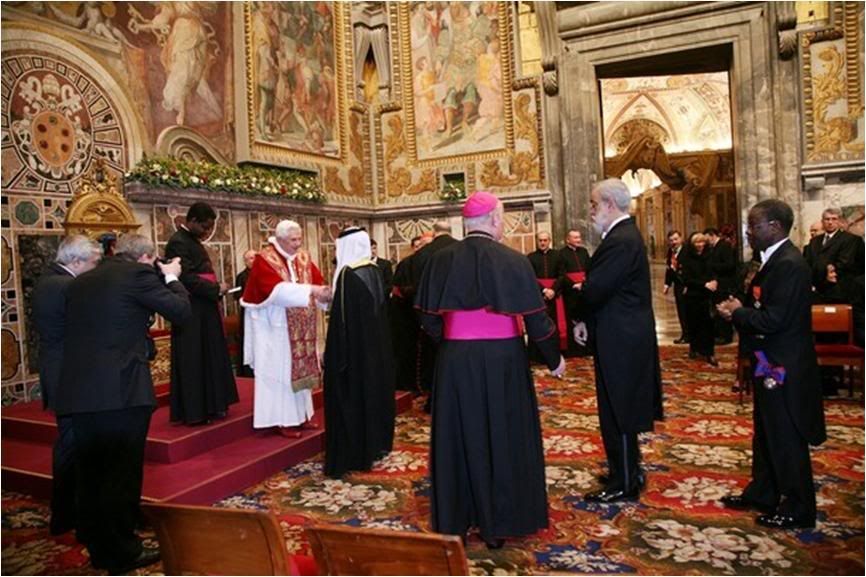 A time for responsibility:
A time for responsibility:
Benedict XVI's address
to the Vatican diplomatic corps
Editorial
By Carlo Di Cicco, Deputy Editor
Translated from
the 1/10/09 issue of

For the catastrophists of our time, it is ever more difficult to categorize Benedict XVI, but after his New Year address to the Vatican diplomatic corps, even the most prejudiced about the Bishop of Rome should find he is right about the things he said.
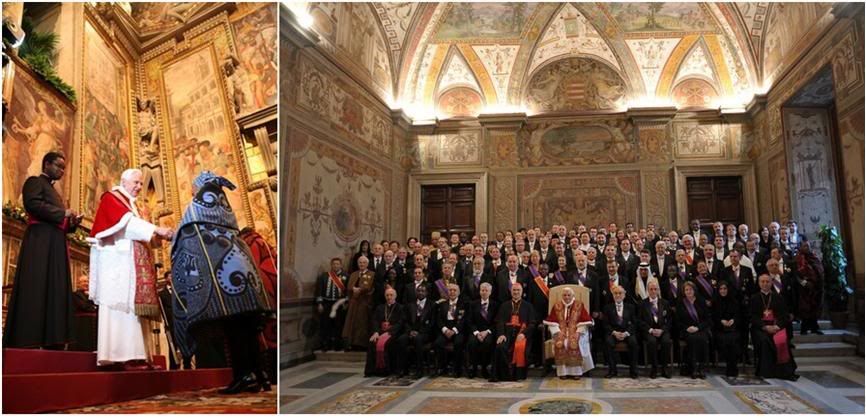
The Pope's annual message to the world of international diplomacy is never the fruit of improvisation nor a purely ritual occasion. Rather, it reflects the priority concerns of the Holy See in the service of peace and evangelization, and it makes clear the sense of the social magisterium of the Catholic Church. Therefore, it is always a very well-considered reading of current world events.
In reviewing all the many situations of suffering in various parts of the world, Benedict XVI chose to look ahead, stressing the educational aspect as the way that can open up new prospects for politics and economic policies that are now in grave throes and increasingly less able to soothe the world's day-to-day worries.
After the address on January 8, it becomes more evident that the letter Benedict XVI sent to the diocese and city of Rome in January 2008 on the educative emergency was no mere intermezzo. That, indeed, it contained a strategic recommendation on how to stop a drift lamented by everyone.
Education depends on the credibility of teachers and their ability to listen to the young who, in their behavior and language, are showing adults what is not working well in society and its institutions, a loss of sense and meaning.
But while asking this of civic and political society, the Pope himself and the Church are exercising this faculty of listening, which makes him able to propose those values which serve even in the economic sector to 'build a new confidence' about day-to-day living.
He told the ambassadors:
This goal will only be reached by implementing an ethics based on the innate dignity of the human person. I know how demanding this will be, yet it is not a utopia!
Today more than in the past, our future is at stake, as well as the fate of our planet and its inhabitants, especially the younger generation which is inheriting a severely compromised economic system and social fabric.
Ladies and Gentlemen, if we wish to combat poverty, we must invest first and foremost in the young, setting before them an ideal of authentic fraternity.
In other words, the Pope is saying that now is the time to take responsibility, to read events not as a result of blind chance but of human choices.
The educational perspective allows politics and the economy regenerate themselves because it would free them from special interests and force them to examine every proposal made in terms of the common good.
One of the most serious disturbances on a global level, the Pope stressed, was the increasing numbers of poor people as a result of growing imbalance in the distribution of resources.
And therefore, poverty can be fought only "if humanity becomes more fraternal as a result of shared values and ideals, founded on the dignity of the person, on freedom joined to responsibility, on the effective recognition of the place of God in the life of man".
Peace itself becomes possible if there is fraternal solidarity among men. Since peace is initiated and guaranteed by the leaders of nations, it is a logical consequence that only those leaders who believe in and are motivated by solidarity among all men would be capable of genuinely working for peace.
But global peace is still a remote objective despite the efforts of many such leaders. And to this obvious fact, the Pope adds two more which are particularly demanding: In order to build the peace, one must give back hope to the poor, while fighting hunger and environmental degradation.
From the educational perspective, this requires changing priorities in the social order of the world.
In the recent international congress on preventive education and human rights according to the principles of Don Bosco, Pascual Chavez, current head of the Salesians and ninth successor to the
Apostle of the Young, observed:
We know that economic interests determine priorities in a materialistic society and that advertising, the incitement to consumerism, is the magic wand employed to feed the insatiable greed of multinational business, that only aggressively competitive societies can survive, but this style has now permeated into educational institutions and associations. What then can we do?
The educational system, he said, must be capable of generating the proper culture and placing all of society in 'a state of education'.
In this sense, Benedict XVI has started to indicate the responses that will help to consolidate efforts in this time of responsibility, relegating to the past the age of 'profound irresponsibility' denounced by everyone, including the incoming President of the United States.
[Modificato da TERESA BENEDETTA 10/01/2009 18:51] |
 10/01/2009 17:28 10/01/2009 17:28 |
|
| | | OFFLINE | | Post: 16.222 | Registrato il: 28/08/2005
| Utente Gold | |
|
 On the eve of the now-traditional Papal mass at the Sistine Chapel on the Feast of the baptism of Our Lord, liturgist Fr. Kocik has assembled pertinent quotations from the Holy Father about liturgical orientation.
On the eve of the now-traditional Papal mass at the Sistine Chapel on the Feast of the baptism of Our Lord, liturgist Fr. Kocik has assembled pertinent quotations from the Holy Father about liturgical orientation.
Tomorrow, as he did for the first time last year, Benedict XVI will say Mass ad orientem, using the built-in altar of the Sistine Chapel in place of the Novus Ordo altar that used to be wheeled into place when Mass was said in what is undoubtedly the most celebrated chapel in the world.
Benedict XVI on Liturgical Orientation:
Salient Quotes
by Fr. Thomas Kocik

Jan. 10, 2009
One of our readers thinks it would be helpful, and time-saving, to provide a collection of quotations from then-Cardinal Ratzinger on the subject of orientation in liturgical prayer. With gratitude to Michael Kowalewski, here it is:
Despite all the variations in practice that have taken place far into the second millenium, one thing has remained clear for the whole of Christendom: praying toward the east is a tradition that goes back to the beginning.
-- The Spirit of the Liturgy (Ignatius Press, 2000), pg. 75.
As I have written in my books, I think that celebration turned towards the east, towards the Christ who is coming, is an apostolic tradition.
-- Looking Again at the Question of Liturgy with Cardinal Ratzinger, ed. Alcuin Reid (St. Michael's Abbey, 2003), pg. 151.
The turning of the priest toward the people has turned the community into a self-enclosed circle. In its outward form, it no longer opens out on what lies ahead and above, but is closed in on itself.
The common turning toward the east was not a "celebration toward the wall"; it did not mean that the priest "had his back to the people": the priest himself was not regarded as so important.
For just as the congregation in the synagogue looked together toward Jerusalem, so in the Christian liturgy the congregation looked together "toward the Lord"....
They did not close themselves into a circle; they did not gaze at one another; but as the pilgrim People of God they set off for the Oriens, for the Christ who comes to meet us....
[A]common turning to the east during the Eucharistic Prayer remains essential. This is not a case of something accidental, but of what is essential. Looking at the priest has no importance. What matters is looking together at the Lord.
-- The Spirit of the Liturgy, pp. 80-81.
Moving the altar cross to the side to give an uninterrupted view of the priest is something I regard as one of the truly absurd phenomena of recent decades.
Is the cross disruptive during the Mass? Is the priest more important than the Lord? This mistake should be corrected as quickly as possible; it can be done without further rebuilding.
-- The Spirit of the Liturgy, pg. 84
...In St. Peter's [Basilica], during the pontificate of St. Gregory the Great (590-604), the altar was moved nearer to the bishop's chair, probably for the simple reason that he was supposed to stand as much as possible above the tomb of St. Peter....
Because of topographical circumstances, it turned out that St. Peter's faced west. Thus, if the celebrating priest wanted - as the Christian tradition of prayer demands - to face east, he had to stand behind the people and look - this is the logical conclusion - toward the people....
The liturgical renewal in our own century took up this alleged model and developed from it a new idea for the form of the liturgy. The Eucharist - so it was said - had to be celebrated versus populum (toward the people).
The altar - as can be seen in the normative model of St. Peter's - had to be positioned in such a way that priest and people looked at each other and formed together the circle of a celebrating community.
This alone - so it was said - was compatible with the meaning of the Christian liturgy, with the requirement of active participation. This alone conformed to the primordial model of the Last Supper.
These arguments seemed in the end so persuasive that after the Council (which says nothing about "turning toward the people"), new altars were set up everywhere, and today celebration versus populum really does look like the characteristic fruit of Vatican II's liturgical renewal.
In fact it is the most conspicuous consequence of a reordering that not only signifies a new external arrangement of the places dedicated to the liturgy, but also brings with it a new idea of the essence of the liturgy - the liturgy as a communal meal.
-- The Spirit of the Liturgy, pp. 76-77
To which I add the following:
...The positive content of the old eastward-facing direction lay not in its orientation to the tabernacle.... The original meaning of what nowadays is called "the priest turning his back on the people" is, in fact - as J.A. Jungmann has consistently shown - the priest and people together facing the same way in a common act of trinitarian worship....
Where priest and people together face the same way, what we have is a cosmic orientation and also an interpretation of the Eucharist in terms of resurrection and trinitarian theology. Hence it is also an interpretation in terms of parousia, a theology of hope, in which every Mass is an approach to the return of Christ.
-- The Feast of Faith (Ignatius Press, 1986), pg. 140
...the cross on the altar is not obstructing the view; it is a common point of reference. It is an open "iconostasis" which, far from hindering unity, actually facilitates it: it is the image which draws and unites the attention of everyone.
I would even be so bold as to suggest that the cross on the altar is actually a necessary precondition for celebrating toward the people.
-- The Feast of Faith, pg. 145
...among the faithful there is an increasing sense of the problems Anherent in an arrangement that hardly shows the liturgy to be open to the things that are above and to the world to come.
-- Foreword to U.M. Lang's Turning towards the Lord (Ignatius Press, 2004), pg. 11
[Modificato da TERESA BENEDETTA 10/01/2009 18:54] |
 10/01/2009 20:55 10/01/2009 20:55 |
|
| | | OFFLINE | | Post: 16.224 | Registrato il: 28/08/2005
| Utente Gold | |
|
 POPE MEETS NEO-CATECHUMENALS
POPE MEETS NEO-CATECHUMENALS
This event was not calendared on the Vatican bulletin today - and still is not, so there is no available text so far.
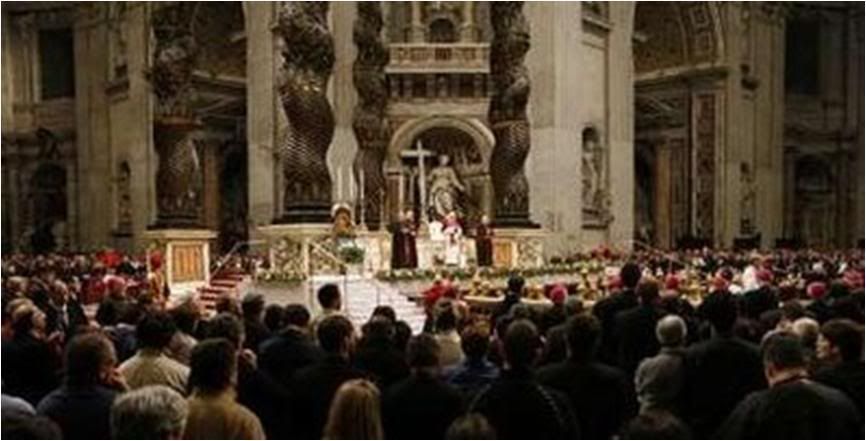

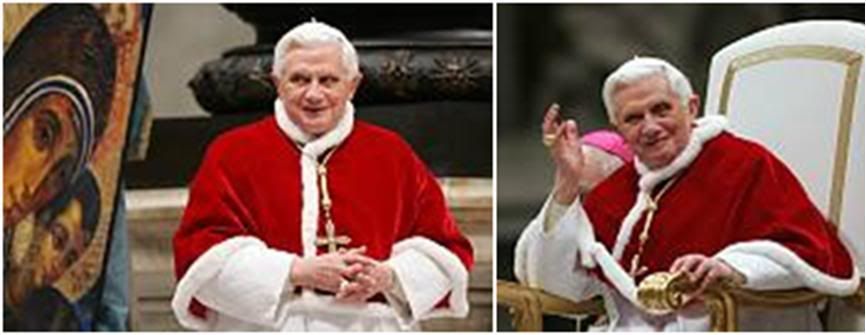
At 5 pm. today, the Holy Father addressed members of the movement called Neo-Catechumenal Way at St. Peter's Basilica on the occasion of their 40th anniversary.
Movement founders Kiko Argüello, Carmen Hernandez and Fr. Mario Pezzi presented to the Pope the first Neo-Catechumenal community in the Roman parish of Santi Martiri Canadesi (Holy Canadian Martyrs), as well as the 'fruits' offered by the movement to the Church in the past 40 years.
As of 2008, the movement was present in more than 900 dioceses around the world, with more than 20,000 communities in 6,000 parishes. It has also helped set up 63 seminaries for training their Redemptoris Mater missionaries.
The movement's characteristic innnovation in its evangelization work is to send out families as missionaries. Under John Paul II, some 400 families were sent out in this capacity. In 2006, Benedict XVI blessed 200 families who were also sent forth on mission.

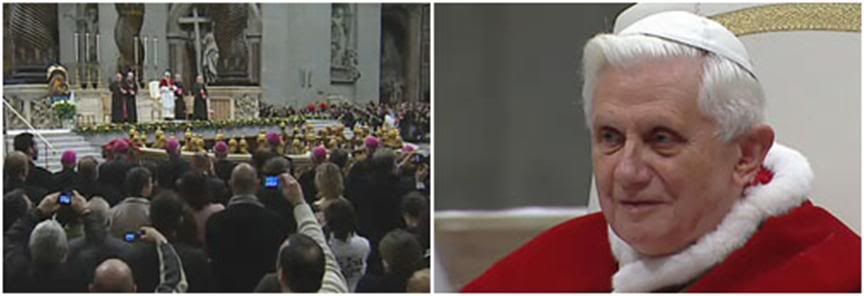 Kiko Arguello (right photo below) reports on the movement.
Kiko Arguello (right photo below) reports on the movement.
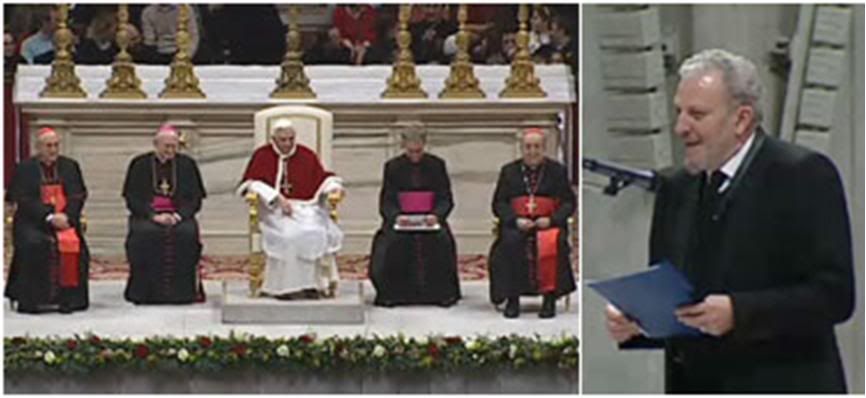
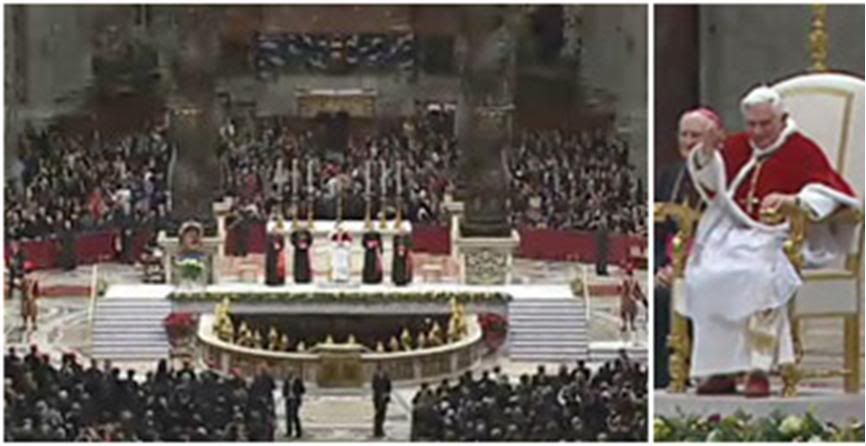 After tensions on liturgy
After tensions on liturgy
and autonomy from dioceses,
Pope asks movement
to follow their bishops and
be one with the Church

VATICAN CITY, Jan. 10 (Translated from Apcom) - Pope Benedict XVI today called on members of the Neo-Catechumenal Way to 'adhere' to their bishops' directives and to 'unity' with the parishes in which they operate.
A prolific and very active movement, the Neo-Catechumenals have had a long and contentious history with the Vatican on liturgy [mainly centered on their unorthodox communion practices and Saturday evening Mass instead of Sunday], resolved last year with the final approval of their operational 'statues' by the Pope.
Additionally, they have had frictions with dioceses around the world because of a religious lifestyle that many consider unorthodox and because they keep themselves apart from the rest of the parish, as if they were autonomous from the diocese.
"Your already meritorious apostolic activity will be even more effective to the degree that you work constantly to cultivate that unity with others that Jesus communicated to the Twelve Apostles at teh Last Supper," Benedict told the assembly, which included their founder-leaders Kiko Argueloo, Carmen Hernandez and Fr. Mario Pezzi.
The Pope said the Neo-Catechumenal 'way' should be one of "obedient adherence to the directives of your pastors and of communion with all other components of the People of God."
He continued: "The recent approval of your Statutes by the Pontifical Council for the Laity was a sign of the esteem and benevolence with which the Holy See has been following the work that the Lord has inspired among your followers."
He also said acknowledged "the generous service you perform in evangelization" and "the great number of priests and consecrated persons that the Lord has called through your communities".
During the encounter, which marks the establishment of the first Neo-Catechumenal community in Rome, the Pope also exhorted the movement's followers in Rome to "intensify your adherence to all the directives of the Cardinal Vicar (Agostino Vallini), who is my direct collaborator in the pastoral supervision of the diocese."
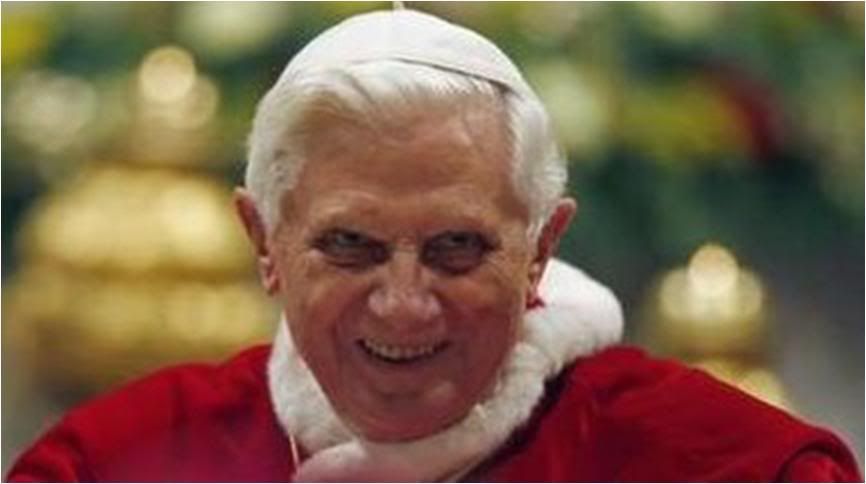
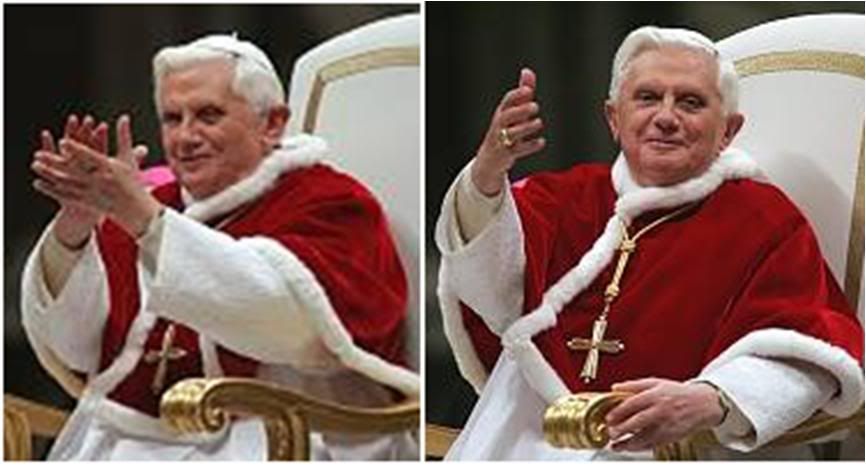
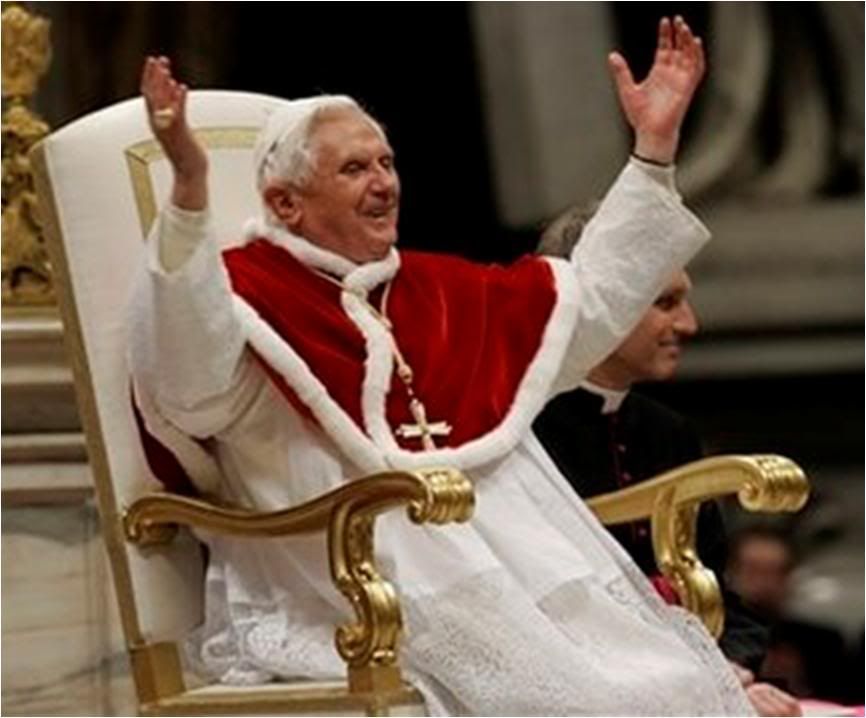 The Holy Father was particularly radiant today!
The Holy Father was particularly radiant today!
[Modificato da TERESA BENEDETTA 11/01/2009 18:02] |
 11/01/2009 07:49 11/01/2009 07:49 |
|
| | | OFFLINE | | Post: 16.228 | Registrato il: 28/08/2005
| Utente Gold | |
|

January 11, Sunday
Feast of the Baptism of our Lord
OR today
 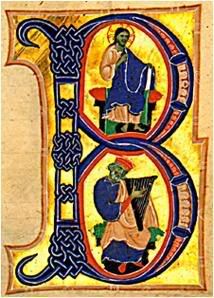
No papal stories in this issue, other than the routine NOSTRE NFORMAZIONI
(list of episcopal resignations and nominations, and schedule of papal events
from the day before). Main stories on Page 1 continue to be the Gaza conflict -
Egypt tries to broker a truce, while Israel keeps up its offensive in Gaza; and
a story about the worst US unemployment situation since 1945. There is an
editorialcommentary about the widespread misuse of the homily by priests
who ignore thatit must be a spiritual reflection on the liturgical readings
of the day.
THE POPE'S DAY

10:00 Sistine Chapel
Holy Mass and Baptism of Babies
The liturgical season of Christmas ends.
*****
12:00 Angelus
[Modificato da TERESA BENEDETTA 11/01/2009 15:40] |
 11/01/2009 15:18 11/01/2009 15:18 |
|
| | | OFFLINE | | Post: 16.229 | Registrato il: 28/08/2005
| Utente Gold | |
|
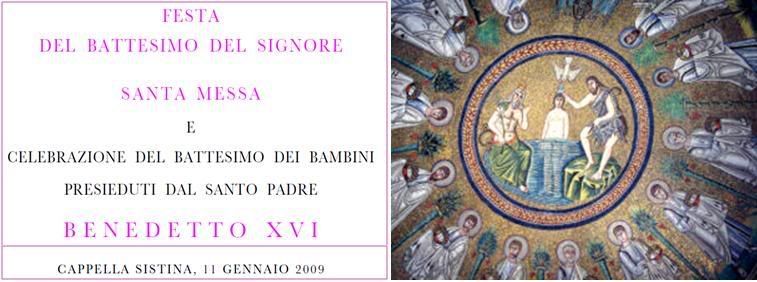 Illustration: Ceiling mosaic, Arian Baptistry, Ravenna.
HOLY MASS OF THE BAPTISM OF OUR LORD
Illustration: Ceiling mosaic, Arian Baptistry, Ravenna.
HOLY MASS OF THE BAPTISM OF OUR LORD
with BAPTISM OF BABIES BY THE HOLY FATHER
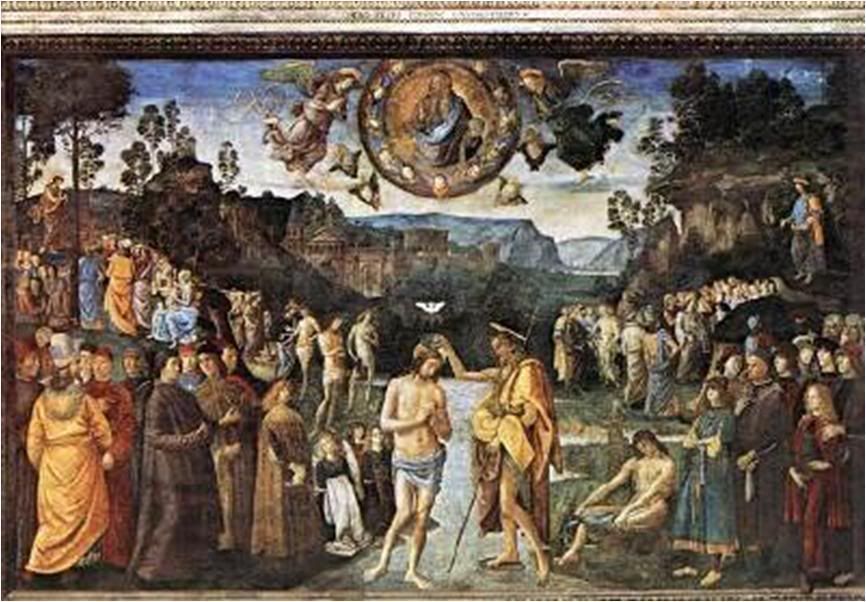 Baptism of Jesus, Perugino/Pinturicchio, c. 1482. Fresco, 325x540 cm (~18x11 ft), Sistine Chapel.
Baptism of Jesus, Perugino/Pinturicchio, c. 1482. Fresco, 325x540 cm (~18x11 ft), Sistine Chapel.
At 10 a.m. today, the Holy Father presided at Holy Mass in the Sistine Chapel, at which he administered Baptism to 13 babies.
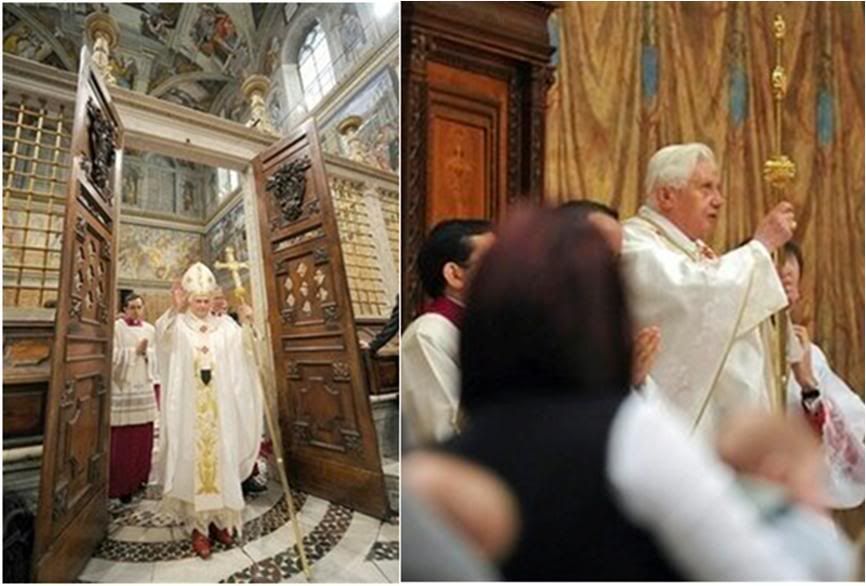
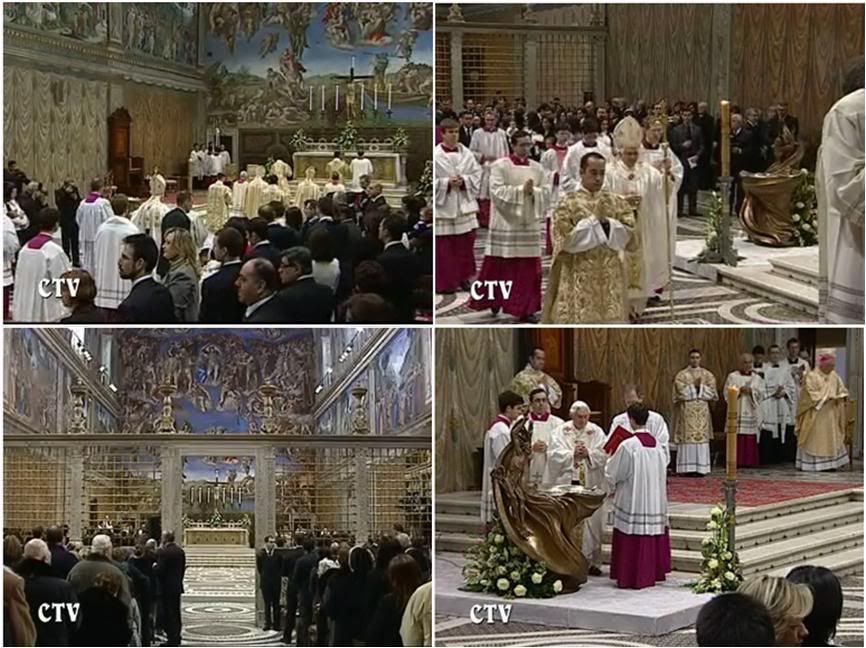
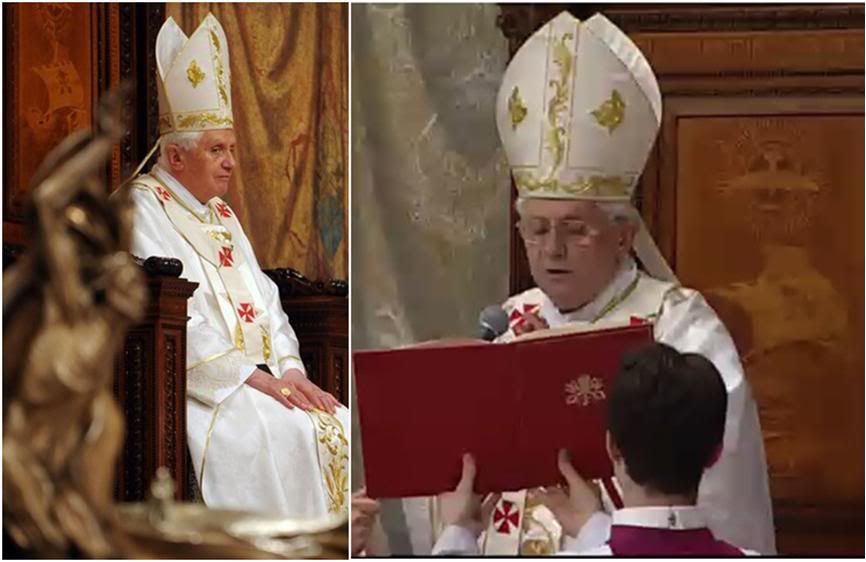 NB: CTV video-caps posted here are from Shawn Tribe at the New Liturgical Movement blog
NB: CTV video-caps posted here are from Shawn Tribe at the New Liturgical Movement blog.
Here is a translation of his homily:
Dear brothers and sisters:
The words used by the evangelist Mark at the start of his Gospel - "You are my beloved Son; with you I am well pleased" - introduce us to the heart of today's Feast of the Baptism of our Lord, which concludes the Christmas season.
The cycle of the season's solemnities allowed us to meditate on the birth of Jesus announced by angels surrounded by the luminous splendor of God. Christmastide speaks to us of the star that led the Magi from the east to the house in Bethlehem, and invites us to look up to heaven which opened up on the Jordan while the voice of God resounded.
They are all signs through which the Lord does not tire of repeating to us: "Yes, I am here. I know you and I love you. There is a road from me that leads to you. And there is a road that leads from you to me."
The Creator took on in Jesus the dimensions of a baby, of a human being like us, so that we can see and touch him. At the same time, by making himself small, the Lord has let shine forth the light of his greatness. By humbling himself to the seemingly helpless impotence of love, he shows us what is true greatness - what it means to be God.
The meaning of Christmas, and more generally, the meaning of the liturgical year, is precisely to bring us closer to these divine signs, to recognize that they are impressed on the events of every day, so that our hearts may open up to the love of God.
If the Nativity and the Epiphany serve above all to make us capable of seeing, to open our eyes and heart to the mystery of a God who comes to be with us, the Feast of the Baptism of Jesus introduces us, we might say, to the quotidianity of a personal relationship with him.
In fact, through immersion in the waters of the Jordan, Jesus united himself to us. Baptism is, so to speak, the bridge that he built between himself and us, the road through which he makes himself accessible to us.
Baptism is the divine rainbow over our lives, the promise of God's great Yes, the gate of hope, and at the same time, the sign which shows us the path to follow actively and joyously in order to meet him and feel his love.
Dear friends, I am truly very glad that even this year, on this feast day, I have been given the opportunity to baptize babies. On them today rests God's 'pleasure'.
From the time the Son of God had himself baptized, Heaven truly opened up and continues to be open, so that we can entrust every new life that blossoms in the hands of him who is more powerful than the dark forces of evil.
In effect, that is what Baptism is: we return to God that which has come from him. The child is not the property of its parents, but is entrusted to their responsibility by the Creator, freely and always in a new way, so that they can help the child become a free child of God.
Only if the parents can ripen this awareness will they succeed in finding the right balance between the claim of being able to dispose of their children as if they were their private possession to be formed according to their personal ideas and desires, and the liberatory attitude of allowing them to grow up in full autonomy, satisfying their every desire and aspiration, considering this the right way to cultivate their individual personality.
If, with this sacrament, the newly baptized baby becomes an adopted child of God, the object of his infinite love which will protect and defend him from the dark forces of evil, one must teach him to recognize God as his father and to learn to relate to him as a son.
Thus, when, following Christian tradition as we do today, children are baptized, introducing them to the light of God and to his teachings, it is not to do them violence, but to give them the richness of divine life in which is rooted the true freedom proper to God's children - freedom that must be educated and formed over the years so that they may be able to make responsible personal choices.
Dear parents, dear godparents, I greet you all with affection and join in your joy over these small ones who today are born into eternal life. Be aware of the gift thus received and do not stop thanking the Lord who, with today's sacrament, introduces your children to a new family, larger and more established, more open and numerous, than the domestic family.
I refer to the the family of believers, to the Church, a family that has God for its Father, and in which all recognize each other as brothers in Jesus Christ.
So today you entrust your children to the goodness of God, who is the force of light and love - they will never feel abandoned if they remain united to Him.
Therefore, take care to educate them in the faith, to teach them to pray and to grow as Jesus did, with his help, "in wisdom, age and grace before God and men" (cfr Lk 2,52).
Turning now to the Gospel, let us try to understand further what is happening today. St. Mark narrates that, while John the Baptist was preaching along the banks of the Jordan, proclaiming the urgency of conversion in view of the imminent coming of the Messiah, Jesus came among the people, resenting himself to be baptized.
John's baptism was certainly one of penitence, but very different from what Jesus would institute. A that moment, the mission of the Redeemer was evident when, upon emerging from the river, a voice echoed from heaven andthe Holy Spirit descended upon him (cfr Mk 1,10).
The heavenly Father proclaimed him his beloved Son and publicly attested his universal mission of salvation which woud be fulfilled with his death of the Cross and his Resurrection.
Only then, with the Paschal sacrifice, is the remission of sins rendered universal and total. With Baptism, we do not simply immerse ourselves in the waters of the Jordan to proclaim our commitment to conversion, but the redeeming blood of Christ pours over us to purify us and to save us.
It is the beloved Son of the Father, in whom he was well pleased, who gives us back our dignity and the joy of calling ourselves truly 'children' of God.
In a while we will relive the mystery evoked by today's solemnity: the signs and symbols of the sacrament of Baptism will help us to understand what the Lord works in the hearts of these babies, making them 'his' for always, the chosen dwelling of his Spirit and 'living stones' for the construction of the spiritual edifice that the Church is.
May the Virgin Mary, Mother of Jesus, the beloved Son of God, watch over them and their families, and accompany them always in order to realize the plan of salvation which Baptism achieves in their lives.
And we, dear brothers and sisters, let us accompany them with our prayers. Let us pray for their parents, godparents and relatives so they may help them grow in the faith. Let us pray for all present here so that, participating devoutly in this celebration, we may renew the promises of our Baptism and give thanks to the Lord for his constant assistance. Amen.
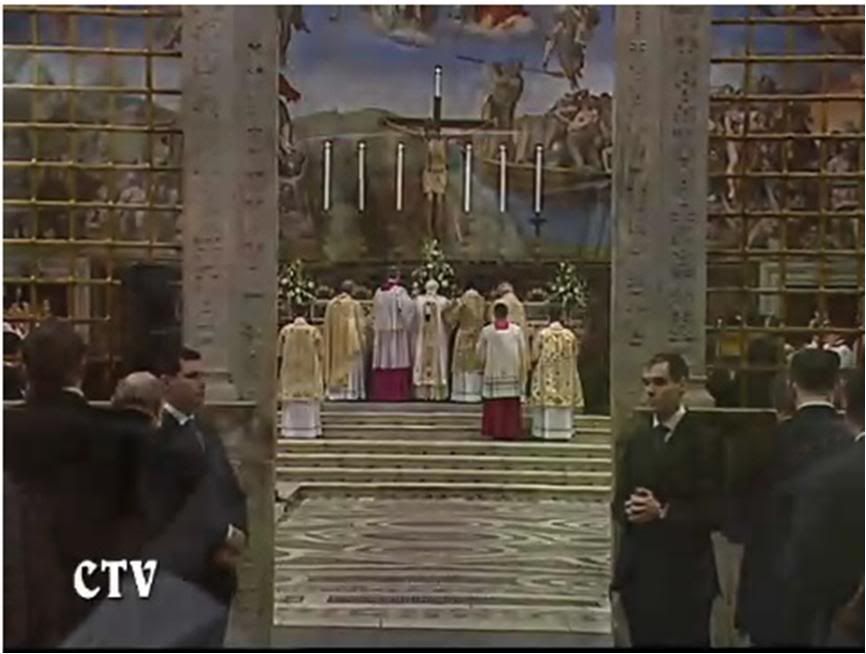
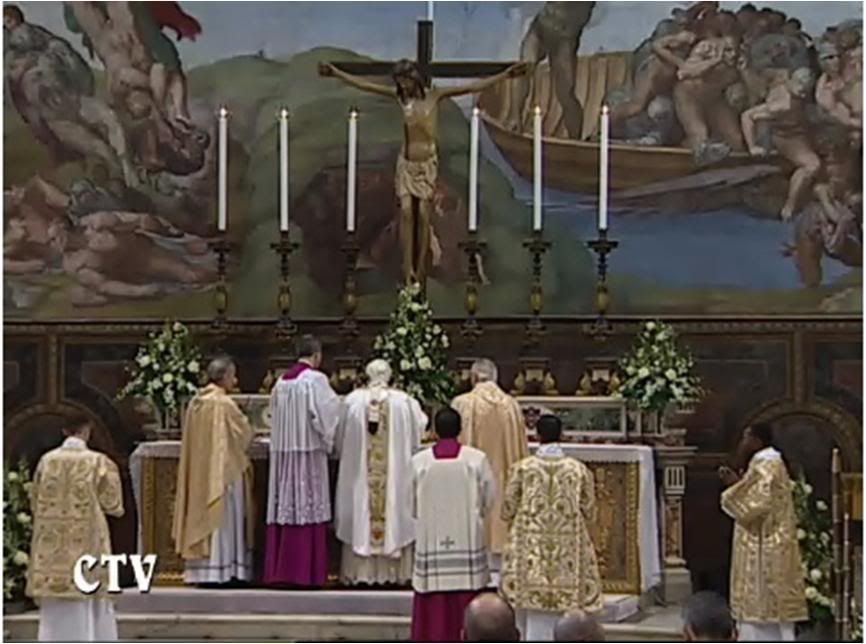
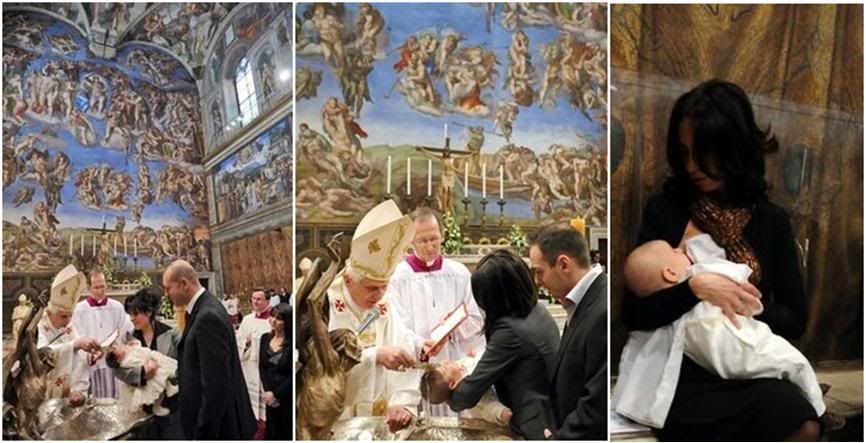
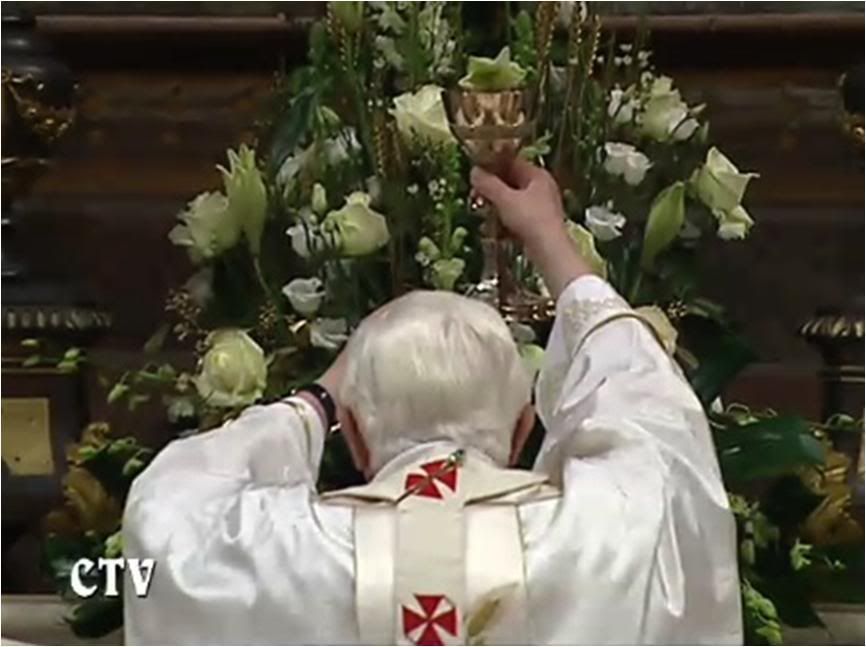
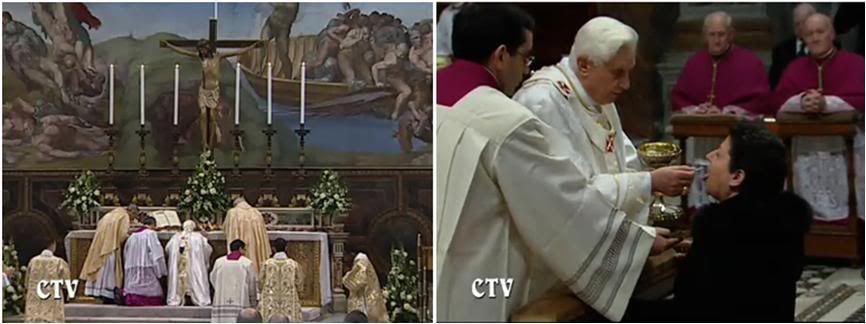
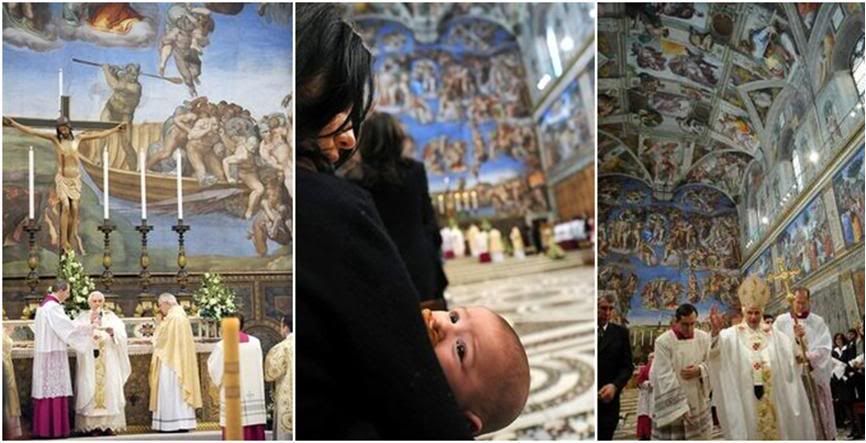 I hope secular critics of Benedict XVI - notably La Repubblica founder-publisher Eugenio Scalfari - are paying better attention this time than they did last year, when, just because the Holy Father decided to celebrate Mass ad orientem, they assumed - and reproached him for it - that he said the entire Mass in Latin.
I hope secular critics of Benedict XVI - notably La Repubblica founder-publisher Eugenio Scalfari - are paying better attention this time than they did last year, when, just because the Holy Father decided to celebrate Mass ad orientem, they assumed - and reproached him for it - that he said the entire Mass in Latin.
The Holy Father is very punctilious, even if the ordinary form of the Mass can well be celebrated in Latin throughout except for the readings:
When he celebrates the Novus Ordo and says it for an international audience as he does with most liturgies held at St. Peter's Basilica, then most of the celebrant's prayers are said in Latin, but readings and the public prayers are delivered in the vernacular (Italian at St. Peter's).
When, however, he is celebrating the Mass for a Roman audience - as the Sistine Chapel Baptism Masses are, being ceremonies performed by the Pope as Bishop of Rome - then all the readings and most of the prayers, even the celebrant's, are in Italian, as they were today.
Likewise, the predominant language used in his US and Australian liturgies was English; and in France, French (except in Lourdes, which has an international audience).
[Modificato da TERESA BENEDETTA 12/01/2009 20:02] |
 11/01/2009 15:49 11/01/2009 15:49 |
|
| | | OFFLINE | | Post: 16.230 | Registrato il: 28/08/2005
| Utente Gold | |
|
 ANGELUS TODAY
ANGELUS TODAY
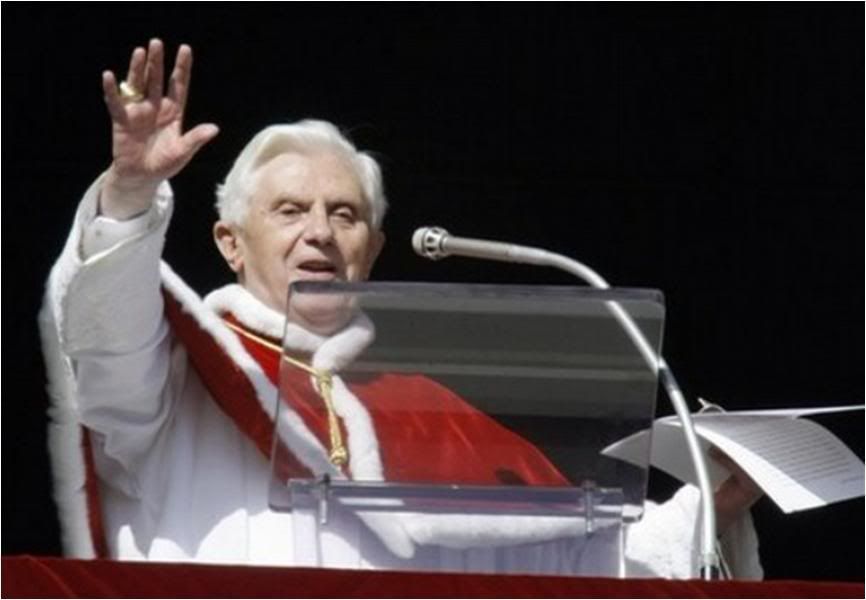
After the Sistine Chapel Mass, the Holy Father led the usual Sunday noon Angelus from his window overlooking St. Peter's Square.
This is what he said in English:
To all the English-speaking visitors and pilgrims here today, I extend affectionate greetings.
On this feast of the Lord’s Baptism, Jesus descends into the waters of the Jordan, taking on himself the weight of our sins. When he rises from the water, the Spirit comes down upon him and the Father’s voice declares: "This is my beloved Son".
Let us rejoice that the Son of God came to share our human condition, so that we might rise with him to everlasting life.
Upon all who are here today, and upon your families and loved ones at home, I invoke God’s abundant blessings.
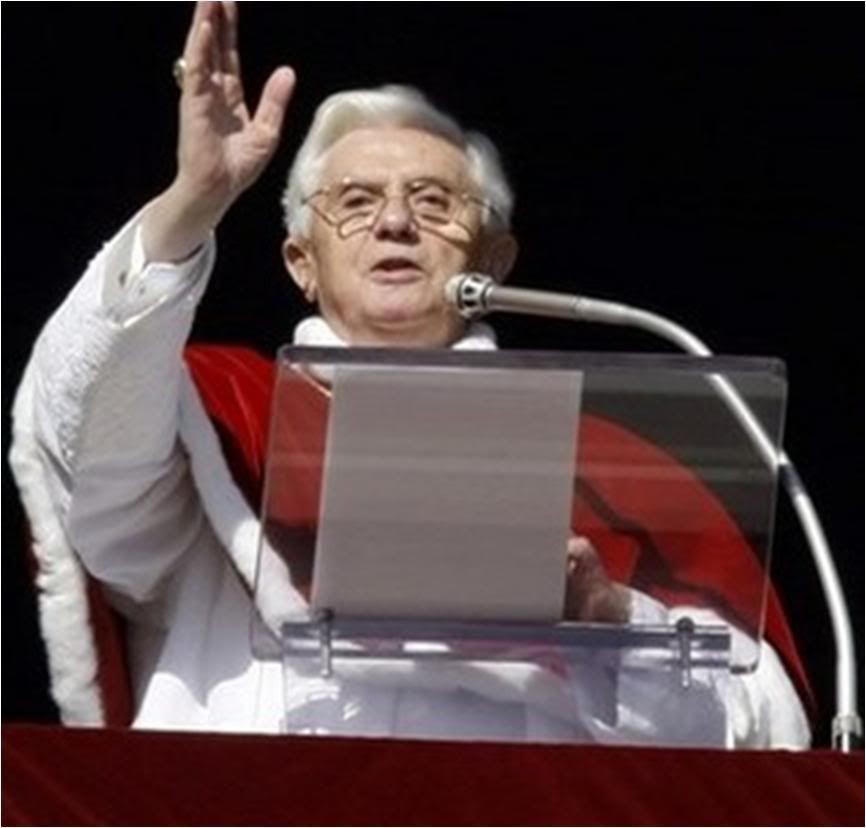 Here is a full translation of his words before the Angelus prayers:
Here is a full translation of his words before the Angelus prayers:
Dear brothers and sisters!
On this Sunday which follows the Solemnity of the Epiphany, we celebrate the Baptism of the Lord. This was the first act of his public life, and it is narrated in all four Gospels.
When he was about 30 years old, Jesus left Nazareth, came to the river Jordan, and amid many others, had himself baptized by John.
The evangelist Mark writes: "On coming up out of the water he saw the heavens being torn open and the Spirit, like a dove, descending upon him. And a voice came from the heavens, 'You are my beloved Son; with you I am well pleased'"(Mk 1,10-11).
Those words - "You are my beloved Son" - reveal what eternal life is: it is the filial relationship with God, as Jesus lived it and as it has been revealed and given to us.
This morning, following tradition, I administered the sacrament of Baptism in the Sistine Chapel to 13 newborn babies.
To the parents and godparents, the celebrant usually asks, "What do you ask the Church of God for your children?" To their answer, "Baptism", he asks, "And what does Baptism give us?" They reply, "Eternal life".
That is the stupendous reality - the human being, through Baptism, becomes invested in the unique and singular relationship of Jesus with the Father, such that the words which resounded from heaven on the only-begotten Son become true for every man and woman who is reborn from the water and the Holy Spirit: You are my beloved Son.
Dear friends, how great is the gift of Baptism! If we only fully considered it, our livea would be a continuous 'grace'. What joy for Christian parents who have seen a new creature bud forth from their love, bring him to the baptismal font and see him reborn in the womb of the Church for a life that will never have an end.
A gift, A joy, but also responsibility. Parents, in fact, along with the godparents, should educate children according to the Gospel.
This brings me to the theme of the VI World Encounter of Families which will take place in the next few days in Mexico City: "The family as educator in human and Christian values".
This huge meeting among families, organized by the Pontifical Council For the Family, will take place on three levels: first, the Theological-Pastoral Congress, in which the theme will be discussed in depth, including an interchange of significant experiences in family life; then, the time of celebration and testimony, which will evoke the beauty of this encounter among families from all over the world, united in the same faith and the same commitment; and finally, the solemn Eucharistic celebration, as an act of thanksgiving to the Lord for the gifts of matrimony, family and life.
I have asked the Cardinal Secretary of State Tarcisio Bertone to represent me there, but I myself will be following this extraordinary event closely, accompanying it with my prayers, and participating through video-conference.
I ask you now, dear brothers and sisters, to implore the abundance of divine graces for this important world encounter of families. Let us do so, invoking the maternal intercession of the Virgin Mary, Queen of the family.
[Modificato da TERESA BENEDETTA 11/01/2009 18:07] |
 11/01/2009 20:03 11/01/2009 20:03 |
|
| | | OFFLINE | | Post: 16.234 | Registrato il: 28/08/2005
| Utente Gold | |
|
 This is an essay by a historian and veteran newspaper commentator who has almost always taken the side of the Church. For this reason, his presentation here is not only eye-opening (at least very much so for me) on the diplomatic background of Vatican-Israel relations) but also, I believe, an attempt to give a fair analysis of the way things are on this issue.
An impossible pacifism
This is an essay by a historian and veteran newspaper commentator who has almost always taken the side of the Church. For this reason, his presentation here is not only eye-opening (at least very much so for me) on the diplomatic background of Vatican-Israel relations) but also, I believe, an attempt to give a fair analysis of the way things are on this issue.
An impossible pacifism
by Ernesto Galli Della Loggia
Translated from

January 10, 2009
The rash comparison made by Cardinal Martino between Gaza and a concentration camp [in this case run by the Israelis] has re-focused attention on the relationship between the Catholic Church and Israel.
This is a subject which - beyond that unfortunate comparison and beyond the very different and moderate statements made by the Pope recently - turns up regularly because it is a contentious issue which at the same time lends itself as few others can. to mirroring the questions and ample dilemmas posed by the histories of Catholicism and Judaism, their historical relationship, as well as the Church's position on the international scene.
As for the Arab-Israeli conflict and the role of the Church in its regard, it still weighs heavily that the Holy See did not immediately recognize the state of Israel and did not do so for more than 30 years, with the paradoxical result of putting the Vatican - the Christian state par excellence - in the ranks of the Arab-Muslim front that refused to recognize Israel.
In 1948 and for decades afterwards, Vatican diplomacy did not understand that recognition of Israel by the Church of Rome was a symbolic gesture that the Church owed to history, as a necessary acknowledgment of certain supreme historical realities.
It would have been a gesture of prophetic import to seal a significant turning-point in a long and very tortured history of Christian-Jewish relations and would have marked a fresh beginning.
The Church needed to reconsider its traditional 'aversion' for the 'deicidal people' who for the first time had succeeded in standing up to acquire an existence as a sovereign state; its disconcertation at seeing a Jewish state become the political master of the cradle of Christianity; and the fact that all this resulted from a singular Protestant-Marxist convergence at the United Nations (the all-important votes of both the United States and the Soviet Union).
At the same time, the pretext used by the Vatican to justify its refusal to recognize Israel, namely, to protect Christian communities in the Middle East, could not have been more illusory.
Indeed, notwithstanding the Vatican's hands-off attitude towards Israel in those decades, most of those communities simply declined progressively through the years to the point of almost complete disappearance.
Added to that refusal to recognize Israel were other signs that appeared far less equivocal. Not to be forgotten was the episode in the 1970s when an Italian Catholic bishop was found out by Israeli authorities carrying weapons in his car for delivery to some Palestinian guerrilla organizations.
How would Italian authorities have reacted, for instance, faced with an analogous situation? And what would they have thought of the fact that there was no action taken whatsoever by religious authorities against the partisan bishop?
Israel reacted with resentment and hostility barely hidden behind the icily formal correctness that has marked its attitude to the Catholic presence in its territory and in the territories that it won in succeeding wars. [This appears to answer my continuing perplexity at Israel's foot-dragging over implementation of an agreement on status signed with the Vatican in 1994 but still the subject of bilateral negotiations for the past 14 years. It doesn't justify the foot-dragging by any means, but it does give a plausible motivation for it. ]
It continues to do so, not distinguishing its treatment of Arab Christians and Muslims, bringing the weight of its authority to bear in its control of the holy places of Christianity.
In this way, Israel has in its turn reflexively taken advantage of its historical opportunity to turn things in its favor: the conditions of submission which for centuries Jews had to suffer within Christian societies has become - at least symbolically - the same conditions that Christians and their institutions now have to endure within the Jewish state.
But the Church's attitude in the Palestine-Israel conflict is colored by a most peculiar reason that goes beyond the reality of
Christian-Jewish relations alone.
This is the fact that this conflict - which a large part of the Western world has always considered at the very least inevitable, and even a 'just war' for Israel, in defense of its right to exist - lays bare the problematic nature of the positions that the Church has increasingly taken in recent years on the question of war.
It is a position, as everyone is aware, that in practice - not in theory, but there have been no exceptions in practice lately - consists of the rejection of war, of any war.
This pacifism inevitably raises a major question which will continue to stand out in the heated public debates that always take place about conflicts in the Middle East, as is obvious these days.
It has to do with the almost-never neutral position of pacifism, especially that of its advocates. In most cases, in fact, this advocacy of peace at any cost does not in any way mean being equidistant from the conflicting parties nor even above partiality.
This is so because in order to be internally consistent, pacifism implies not only being against any war, under any circumstances, but to denounce continually every manifestation of possible conflict, of any type or degree, which necessarily precedes any eruption of armed hostilities.
It is therefore legitimate to ask: Has the Holy See, which is against Israel's current military offensive, expressed itself in the same way, with the same clearness, the same tone, the same insistence, and above all, with the same newsmaking obviousness, about the foreign policies of Syrian and Iran? Or about the daily manifestations of violence by Palestinians against Israel and among the Palestinian factions themselves?
Everyone can answer that for himself.
It remains to be said that a true pacifist policy is truthfully impossible for any vast and complex institution, which must protect and defend a variety of interests, because if pacifism is to be consistent and coherent, it would imply renouncing any 'political' influence - based, as in this case it is inevitably, on alliances (open or tacit) - to limit itself to an exclusively moral position.
But the Church of Rome does not appear to be headed in this direction. Is it allowed to add, 'fortunately'?
[Does Galli della Loggia mean that although the Church necessarily stresses its moral teaching, it also hopes to influence political reality, and pacifism is not the way to do that? Does the 'fortunately' mean it would be good for the
Vatican to have some influence on Realpolitik, i.e., a non-'pacifistic' position even while exhorting peace, but in equal manner and tone on all the parties to any conflict? The assumption is, of course, that the Vatican wants its position, though primarily based on 'moral' grounds, to make a real difference, instead of being reduced to routine noises in the background that are immaterial to any of the protagonists.
I would so love to have someone authoritative - preferably someone familiar with Joseph Ratzinger's thinking - give a considered reply to this essay. Because I am truly puzzled and disturbed by the seeming moral inequivalence given to Palestinian terrorists daily attacks on Israel with naked genocidal intention, and Israel's military actions to defend itself. What should it do - fight Palestinian terrorists with guerrillas? Even if Israel's response appears to be excessive, how can Palestinian terrorist attacks be considered 'just' in any case? ]
[Modificato da TERESA BENEDETTA 12/01/2009 01:20] |
 11/01/2009 20:46 11/01/2009 20:46 |
|
| | | OFFLINE | Post: 1.711 | Registrato il: 27/11/2005
| Utente Veteran | |
|
|
|
|
|
|